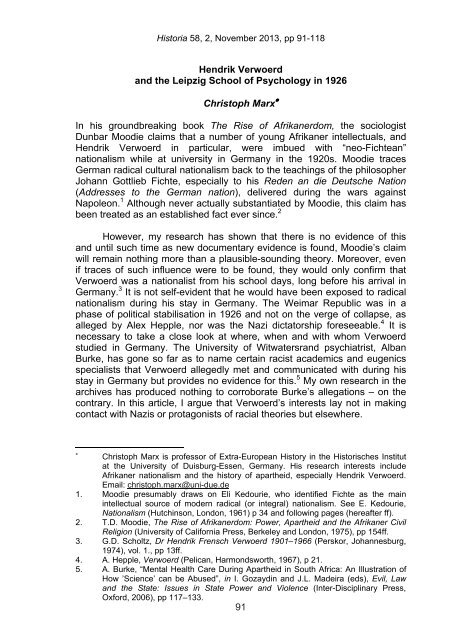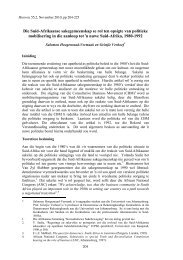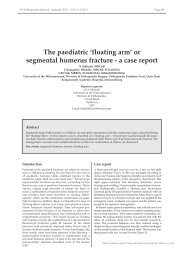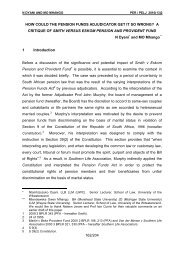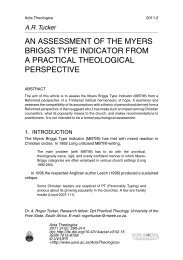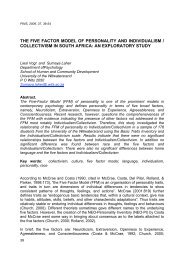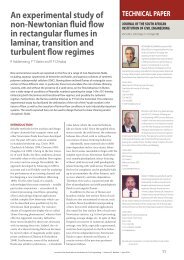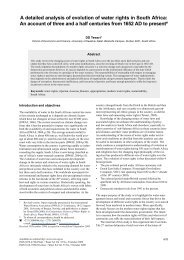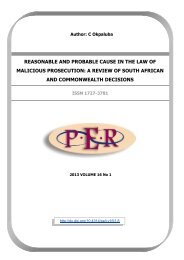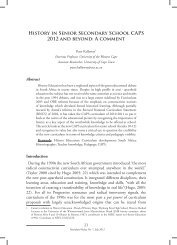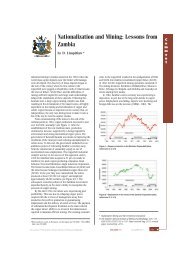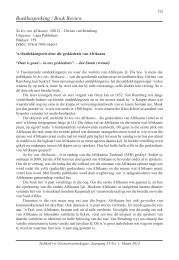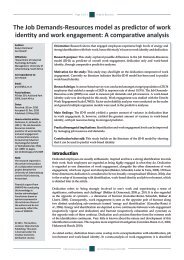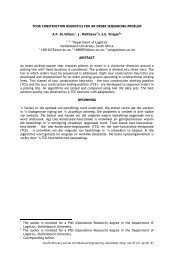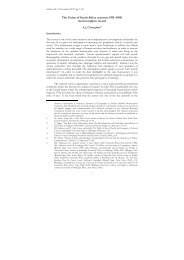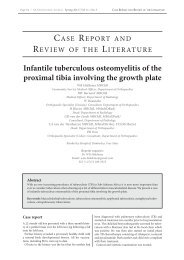91 Hendrik Verwoerd and the Leipzig School of Psychology in 1926 ...
91 Hendrik Verwoerd and the Leipzig School of Psychology in 1926 ...
91 Hendrik Verwoerd and the Leipzig School of Psychology in 1926 ...
You also want an ePaper? Increase the reach of your titles
YUMPU automatically turns print PDFs into web optimized ePapers that Google loves.
Historia 58, 2, November 2013, pp <strong>91</strong>-118<br />
<strong>Hendrik</strong> <strong>Verwoerd</strong><br />
<strong>and</strong> <strong>the</strong> <strong>Leipzig</strong> <strong>School</strong> <strong>of</strong> <strong>Psychology</strong> <strong>in</strong> <strong>1926</strong><br />
Christoph Marx <br />
In his groundbreak<strong>in</strong>g book The Rise <strong>of</strong> Afrikanerdom, <strong>the</strong> sociologist<br />
Dunbar Moodie claims that a number <strong>of</strong> young Afrikaner <strong>in</strong>tellectuals, <strong>and</strong><br />
<strong>Hendrik</strong> <strong>Verwoerd</strong> <strong>in</strong> particular, were imbued with “neo-Fichtean”<br />
nationalism while at university <strong>in</strong> Germany <strong>in</strong> <strong>the</strong> 1920s. Moodie traces<br />
German radical cultural nationalism back to <strong>the</strong> teach<strong>in</strong>gs <strong>of</strong> <strong>the</strong> philosopher<br />
Johann Gottlieb Fichte, especially to his Reden an die Deutsche Nation<br />
(Addresses to <strong>the</strong> German nation), delivered dur<strong>in</strong>g <strong>the</strong> wars aga<strong>in</strong>st<br />
Napoleon. 1 Although never actually substantiated by Moodie, this claim has<br />
been treated as an established fact ever s<strong>in</strong>ce. 2<br />
However, my research has shown that <strong>the</strong>re is no evidence <strong>of</strong> this<br />
<strong>and</strong> until such time as new documentary evidence is found, Moodie’s claim<br />
will rema<strong>in</strong> noth<strong>in</strong>g more than a plausible-sound<strong>in</strong>g <strong>the</strong>ory. Moreover, even<br />
if traces <strong>of</strong> such <strong>in</strong>fluence were to be found, <strong>the</strong>y would only confirm that<br />
<strong>Verwoerd</strong> was a nationalist from his school days, long before his arrival <strong>in</strong><br />
Germany. 3 It is not self-evident that he would have been exposed to radical<br />
nationalism dur<strong>in</strong>g his stay <strong>in</strong> Germany. The Weimar Republic was <strong>in</strong> a<br />
phase <strong>of</strong> political stabilisation <strong>in</strong> <strong>1926</strong> <strong>and</strong> not on <strong>the</strong> verge <strong>of</strong> collapse, as<br />
alleged by Alex Hepple, nor was <strong>the</strong> Nazi dictatorship foreseeable. 4 It is<br />
necessary to take a close look at where, when <strong>and</strong> with whom <strong>Verwoerd</strong><br />
studied <strong>in</strong> Germany. The University <strong>of</strong> Witwatersr<strong>and</strong> psychiatrist, Alban<br />
Burke, has gone so far as to name certa<strong>in</strong> racist academics <strong>and</strong> eugenics<br />
specialists that <strong>Verwoerd</strong> allegedly met <strong>and</strong> communicated with dur<strong>in</strong>g his<br />
stay <strong>in</strong> Germany but provides no evidence for this. 5 My own research <strong>in</strong> <strong>the</strong><br />
archives has produced noth<strong>in</strong>g to corroborate Burke’s allegations – on <strong>the</strong><br />
contrary. In this article, I argue that <strong>Verwoerd</strong>’s <strong>in</strong>terests lay not <strong>in</strong> mak<strong>in</strong>g<br />
contact with Nazis or protagonists <strong>of</strong> racial <strong>the</strong>ories but elsewhere.<br />
<br />
Christoph Marx is pr<strong>of</strong>essor <strong>of</strong> Extra-European History <strong>in</strong> <strong>the</strong> Historisches Institut<br />
at <strong>the</strong> University <strong>of</strong> Duisburg-Essen, Germany. His research <strong>in</strong>terests <strong>in</strong>clude<br />
Afrikaner nationalism <strong>and</strong> <strong>the</strong> history <strong>of</strong> apar<strong>the</strong>id, especially <strong>Hendrik</strong> <strong>Verwoerd</strong>.<br />
Email: christoph.marx@uni-due.de<br />
1. Moodie presumably draws on Eli Kedourie, who identified Fichte as <strong>the</strong> ma<strong>in</strong><br />
<strong>in</strong>tellectual source <strong>of</strong> modern radical (or <strong>in</strong>tegral) nationalism. See E. Kedourie,<br />
Nationalism (Hutch<strong>in</strong>son, London, 1961) p 34 <strong>and</strong> follow<strong>in</strong>g pages (hereafter ff).<br />
2. T.D. Moodie, The Rise <strong>of</strong> Afrikanerdom: Power, Apar<strong>the</strong>id <strong>and</strong> <strong>the</strong> Afrikaner Civil<br />
Religion (University <strong>of</strong> California Press, Berkeley <strong>and</strong> London, 1975), pp 154ff.<br />
3. G.D. Scholtz, Dr <strong>Hendrik</strong> Frensch <strong>Verwoerd</strong> 1901–1966 (Perskor, Johannesburg,<br />
1974), vol. 1., pp 13ff.<br />
4. A. Hepple, <strong>Verwoerd</strong> (Pelican, Harmondsworth, 1967), p 21.<br />
5. A. Burke, “Mental Health Care Dur<strong>in</strong>g Apar<strong>the</strong>id <strong>in</strong> South Africa: An Illustration <strong>of</strong><br />
How ’Science’ can be Abused”, <strong>in</strong> I. Gozayd<strong>in</strong> <strong>and</strong> J.L. Madeira (eds), Evil, Law<br />
<strong>and</strong> <strong>the</strong> State: Issues <strong>in</strong> State Power <strong>and</strong> Violence (Inter-Discipl<strong>in</strong>ary Press,<br />
Oxford, 2006), pp 117–133.<br />
<strong>91</strong>
<strong>Hendrik</strong> <strong>Verwoerd</strong> <strong>and</strong> <strong>the</strong> <strong>Leipzig</strong> <strong>School</strong> <strong>of</strong> Pscyhology<br />
In <strong>in</strong>vestigat<strong>in</strong>g Moodie’s allegations regard<strong>in</strong>g <strong>the</strong> formative <strong>in</strong>fluence<br />
<strong>of</strong> German <strong>in</strong>tellectuals on Afrikaner nationalism, it makes sense to<br />
concentrate on <strong>Verwoerd</strong>’s time <strong>in</strong> <strong>Leipzig</strong> because <strong>the</strong> Psychological<br />
Institute <strong>the</strong>re is <strong>the</strong> most likely site <strong>of</strong> <strong>the</strong> alleged political <strong>in</strong>fluence from<br />
German scholars. It was <strong>the</strong> <strong>Leipzig</strong> psychologists who exhibited rightist<br />
political lean<strong>in</strong>gs, unlike <strong>the</strong>ir colleagues <strong>in</strong> Berl<strong>in</strong> <strong>and</strong> Hamburg, none <strong>of</strong><br />
whom were drawn by radical nationalism.<br />
Most overviews <strong>of</strong> <strong>the</strong> history <strong>of</strong> psychology <strong>in</strong> South Africa mention<br />
that <strong>Hendrik</strong> <strong>Verwoerd</strong> was a lecturer <strong>in</strong> psychology before enter<strong>in</strong>g politics.<br />
Besides <strong>the</strong> occasional comment however, no research on this period has<br />
been undertaken so far. 6 What we know is that <strong>Verwoerd</strong> studied<br />
psychology <strong>and</strong> philosophy at Stellenbosch <strong>and</strong> wrote a Master’s <strong>the</strong>sis <strong>in</strong><br />
each <strong>of</strong> <strong>the</strong>se subjects <strong>in</strong> 1922. From 1923 he was a lecturer <strong>in</strong> psychology<br />
at Stellenbosch. He wrote his PhD <strong>the</strong>sis, entitled “Die Afstomp<strong>in</strong>g van<br />
Gemoedsa<strong>and</strong>oen<strong>in</strong>ge” (The Blunt<strong>in</strong>g <strong>of</strong> <strong>the</strong> Emotions) based on laboratory<br />
experiments. He received his doctorate cum laude from Stellenbosch<br />
University <strong>in</strong> 1924 <strong>and</strong> was awarded a £150 Croll & Gray scholarship to<br />
study abroad. He spent three semesters <strong>in</strong> Germany (<strong>1926</strong>–27) <strong>and</strong> three<br />
months <strong>in</strong> <strong>the</strong> USA. 7 His stay <strong>in</strong> <strong>the</strong> US was cut short follow<strong>in</strong>g his<br />
appo<strong>in</strong>tment to <strong>the</strong> chair <strong>of</strong> Applied <strong>Psychology</strong> <strong>and</strong> Psychotechnics at his<br />
alma mater, Stellenbosch, from January 1928. 8<br />
6. Short notes can be found <strong>in</strong> J. Louw, “This is thy Work: A Contextual History <strong>of</strong><br />
Applied <strong>Psychology</strong> <strong>and</strong> Labour <strong>in</strong> South Africa”, PhD <strong>the</strong>sis, University <strong>of</strong><br />
Amsterdam, 1984, p 84; D. Foster, “‘Race’ <strong>and</strong> Racism <strong>in</strong> South African<br />
<strong>Psychology</strong>”, South African Journal <strong>of</strong> <strong>Psychology</strong>, 21, 19<strong>91</strong>, pp 203–210,<br />
especially p 205; <strong>and</strong> from <strong>the</strong> same author, “Critical <strong>Psychology</strong>: A Historical<br />
Overview”, <strong>in</strong> C. van Ommen <strong>and</strong> D. Pa<strong>in</strong>ter (eds), Interiors: A History <strong>of</strong><br />
<strong>Psychology</strong> <strong>in</strong> South Africa (Unisa Press, Pretoria, 2008), pp 92–122, especially p<br />
99. Little <strong>in</strong>formation on <strong>Verwoerd</strong> is provided by J.F. Pfaffe, “Die Geschichte der<br />
an Hochschulen <strong>in</strong>stitutionalisierten Psychologie <strong>in</strong> Südafrika”, Geschichte der<br />
Psychologie, No. 11, 4, 2, 1987, pp 66–77, especially p 67. The widely quoted<br />
article by R.B. Miller, “Science <strong>and</strong> Society <strong>in</strong> <strong>the</strong> Early Career <strong>of</strong> H.F. <strong>Verwoerd</strong>”,<br />
Journal <strong>of</strong> Sou<strong>the</strong>rn African Studies, 19, 4, 1993, pp 634–661, on <strong>the</strong> young<br />
<strong>Verwoerd</strong>, is mislead<strong>in</strong>g <strong>in</strong> many respects. It has proved particularly problematic<br />
because it has been used by many authors as a reference work despite Miller’s<br />
very selective <strong>and</strong> superficial perusal <strong>of</strong> <strong>the</strong> <strong>Verwoerd</strong> papers. Her allegation that<br />
<strong>Verwoerd</strong> became a nationalist out <strong>of</strong> sheer opportunism <strong>in</strong> about 1937 is not just<br />
implausible but <strong>in</strong>correct accord<strong>in</strong>g to <strong>the</strong> evidence. Scholtz’s biography <strong>of</strong><br />
<strong>Verwoerd</strong> <strong>in</strong> particular provides clear evidence that <strong>Verwoerd</strong> was already a<br />
nationalist when he was a teenager. Yet Miller completely disregards all Scholtz’s<br />
evidence on <strong>Verwoerd</strong>’s nationalism. Although Scholtz’s biography is ra<strong>the</strong>r<br />
hagiographic, it is never<strong>the</strong>less valuable because he had access to <strong>the</strong> <strong>Verwoerd</strong><br />
family archive <strong>and</strong> <strong>the</strong>refore to <strong>in</strong>formation o<strong>the</strong>r writers do not provide. See<br />
Scholtz, <strong>Verwoerd</strong>, vol. 1, chapters 1–3. See also C. Marx, “<strong>Hendrik</strong> <strong>Verwoerd</strong>’s<br />
Long March to Apar<strong>the</strong>id: Nationalism <strong>and</strong> Racism <strong>in</strong> South Africa”, <strong>in</strong> M. Berg <strong>and</strong><br />
S. Wendt (eds), Racism <strong>in</strong> <strong>the</strong> Modern World: Historical Perspectives on Cultural<br />
Transfer <strong>and</strong> Adaptation (Berghahn, New York <strong>and</strong> Oxford, 2011), pp 281–302.<br />
7. <strong>Verwoerd</strong>’s Croll Scholarship began <strong>in</strong> January <strong>1926</strong> <strong>and</strong> was valid until <strong>the</strong> end <strong>of</strong><br />
his stay overseas <strong>in</strong> January 1928. See Stellenbosch University Archives<br />
(hereafter SUA), Senate notes, p 377.<br />
8. SUA, Senate notes, meet<strong>in</strong>g <strong>of</strong> 5 December 1927, p 165; SUA, Personal file, H.F.<br />
<strong>Verwoerd</strong>, letter from Registrar to <strong>Verwoerd</strong>, 6 December 1927, tell<strong>in</strong>g him about<br />
92
<strong>Hendrik</strong> <strong>Verwoerd</strong> <strong>and</strong> <strong>the</strong> <strong>Leipzig</strong> <strong>School</strong> <strong>of</strong> Pscyhology<br />
The ma<strong>in</strong> purpose <strong>of</strong> <strong>Verwoerd</strong>’s stay <strong>in</strong> Germany was to become<br />
acqua<strong>in</strong>ted with <strong>the</strong> latest research trends <strong>in</strong> <strong>in</strong>ternational psychology. He<br />
chose Germany <strong>and</strong> <strong>the</strong> USA because <strong>of</strong> <strong>the</strong>ir reputation for psychology at<br />
<strong>the</strong> time, but his specific <strong>in</strong>terests <strong>in</strong> <strong>the</strong> field were manifested <strong>in</strong> his choice<br />
<strong>of</strong> universities. 9 <strong>Verwoerd</strong> spent one semester each at <strong>the</strong> psychological<br />
<strong>in</strong>stitutes <strong>of</strong> universities <strong>in</strong> <strong>Leipzig</strong> (20 April to 26 July <strong>1926</strong>), Hamburg (23<br />
October <strong>1926</strong> to 18 February 1927), <strong>and</strong> Berl<strong>in</strong> (28 April to 8 August<br />
1927). 10 Their emphasis on applied psychology, his ma<strong>in</strong> <strong>in</strong>terest, made<br />
<strong>the</strong>se universities particularly attractive for him. 11<br />
Draw<strong>in</strong>g on academic notes <strong>and</strong> papers <strong>in</strong> <strong>the</strong> <strong>Verwoerd</strong> collection as<br />
well as a number <strong>of</strong> archival <strong>and</strong> published sources, I shall <strong>in</strong>vestigate <strong>the</strong><br />
possible <strong>in</strong>fluence <strong>of</strong> <strong>the</strong> German psychologists on <strong>Verwoerd</strong>’s th<strong>in</strong>k<strong>in</strong>g.<br />
Here it is important to differentiate between <strong>the</strong> scholarly <strong>in</strong>fluences <strong>and</strong> <strong>the</strong><br />
overtly ideological or political ones, <strong>in</strong>clud<strong>in</strong>g “neo-Fichtean nationalism”.<br />
The ideological implications <strong>of</strong> <strong>the</strong>se <strong>in</strong>fluences will be dealt with at <strong>the</strong> end<br />
<strong>of</strong> this article. I shall beg<strong>in</strong> with <strong>the</strong> <strong>Leipzig</strong> school <strong>and</strong> its ma<strong>in</strong><br />
representatives. Us<strong>in</strong>g <strong>the</strong> available sources to trace possible <strong>in</strong>fluences <strong>of</strong><br />
<strong>the</strong> <strong>Leipzig</strong> psychologists on <strong>Verwoerd</strong>, I will attempt to reconstruct<br />
<strong>Verwoerd</strong>’s sojourn <strong>the</strong>re. Three fields <strong>of</strong> psychology are deemed relevant<br />
for <strong>the</strong> purposes <strong>of</strong> my research, namely characterology, developmental<br />
his appo<strong>in</strong>tment as from 25 February 1928. On <strong>Verwoerd</strong>’s career at Stellenbosch<br />
see also, H.B. Thom et al. (eds), Stellenbosch 1866–1966: Honderd Jaar Hoër<br />
Onderwys (Nasionale Boekh<strong>and</strong>el, Cape Town, 1966), p 519.<br />
9. Possibly his decision was prefigured by <strong>the</strong> fact that <strong>Verwoerd</strong> spent his first years<br />
as a pupil at a German Lu<strong>the</strong>ran school <strong>in</strong> Wynberg. German was actually his first<br />
language for a couple <strong>of</strong> years <strong>and</strong> he spoke it fluently. See University <strong>of</strong> <strong>the</strong> Free<br />
State, Institute for Contemporary History (hereafter INCH), Len <strong>Verwoerd</strong><br />
Collection, PV 72/3, untitled article (beg<strong>in</strong>n<strong>in</strong>g with “Ons kom nou <strong>in</strong> Wynberg …”),<br />
p 6.<br />
10. I am grateful to Pr<strong>of</strong>. Wilhelm <strong>Verwoerd</strong>, who provided me (via e-mail from 25<br />
March 2012) with <strong>the</strong> dates, names <strong>of</strong> lecturers <strong>and</strong> content <strong>of</strong> <strong>the</strong> courses<br />
<strong>Verwoerd</strong> attended while he was <strong>in</strong> Germany.<br />
11. <strong>Verwoerd</strong> was not <strong>the</strong> only South African who studied at <strong>the</strong> Psychological Institute<br />
<strong>in</strong> <strong>Leipzig</strong>. Nicholas du Preez from Nigel was <strong>the</strong>re at <strong>the</strong> same time <strong>and</strong> <strong>the</strong>y<br />
attended at least one course toge<strong>the</strong>r. Obviously <strong>the</strong>y knew each o<strong>the</strong>r from<br />
Stellenbosch University <strong>and</strong> Du Preez arrived only about a week after <strong>Verwoerd</strong> <strong>in</strong><br />
<strong>Leipzig</strong>. See INCH, Len <strong>Verwoerd</strong> Collection, PV 72/3, untitled manuscript<br />
(beg<strong>in</strong>n<strong>in</strong>g with “Ons staan <strong>in</strong> Drosdystraat …”), p 17. After <strong>Verwoerd</strong> had left, a<br />
certa<strong>in</strong> J. Meir<strong>in</strong>g also studied <strong>the</strong>re. His dissertation “Über die psychischen<br />
E<strong>in</strong>flüsse und Bildungswerte von Leibesübungen” was externally supervised by<br />
Klemm <strong>and</strong> later submitted at <strong>the</strong> University <strong>of</strong> Heidelberg. See F. Krueger, “Otto<br />
Klemm und das Psychologische Institut der Universität <strong>Leipzig</strong>”, Zeitschrift für<br />
angew<strong>and</strong>te Psychologie und Charakterkunde, 56, 1939, p 44. Wilfried Schmidt-<br />
Durban’s name suggests that he was perhaps a South African <strong>of</strong> German orig<strong>in</strong>.<br />
See W. Schmidt-Durban, “Experimentelle Untersuchungen zur Typologie der<br />
Wahrnehmung”, Neue Psychologische Studien, 15, 2, München 1939, pp 8–85. A<br />
valuable overview <strong>of</strong> applied psychology (Psychotechnik) <strong>in</strong> Germany after <strong>the</strong><br />
First World War can be found <strong>in</strong> U. Geuter, Die Pr<strong>of</strong>essionalisierung der deutschen<br />
Psychologie im Nationalsozialismus, (Suhrkamp, Frankfurt, 1988), pp 88ff.<br />
93
<strong>Hendrik</strong> <strong>Verwoerd</strong> <strong>and</strong> <strong>the</strong> <strong>Leipzig</strong> <strong>School</strong> <strong>of</strong> Pscyhology<br />
psychology <strong>and</strong> ethnopsychology (Völkerpsychologie). The focus will fall<br />
exclusively on <strong>the</strong> last two. 12<br />
The <strong>Leipzig</strong> Institute <strong>and</strong> holistic psychology<br />
The <strong>Leipzig</strong> Institute for Experimental <strong>Psychology</strong> was founded <strong>in</strong> 1879 by<br />
Wilhelm Wundt (1832–1920). The first psychological research <strong>in</strong>stitute <strong>in</strong> <strong>the</strong><br />
world, it was funded by Wundt himself dur<strong>in</strong>g <strong>the</strong> early years. Wundt was a<br />
protagonist <strong>of</strong> positivist methodology <strong>in</strong> psychological research, a field that<br />
was closely connected to associationist psychology. 13 He believed that<br />
sensations were <strong>the</strong> basic units <strong>of</strong> psychological measurement <strong>and</strong> thus not<br />
fur<strong>the</strong>r divisible. The associations were comb<strong>in</strong>ations <strong>of</strong> sensations <strong>in</strong> an<br />
approach that was rooted <strong>in</strong> <strong>the</strong> tradition <strong>of</strong> David Hume’s epistemology. 14<br />
Wundt’s sensations were structurally similar, ra<strong>the</strong>r like “psychic atoms”.<br />
From <strong>the</strong>m perception, experience <strong>and</strong> reactions were constituted as<br />
“psychic formations” (psychische Gebilde), to use Wundt’s term<strong>in</strong>ology.<br />
These psychic formations were made up <strong>of</strong> <strong>the</strong> same basic units, differ<strong>in</strong>g<br />
from each o<strong>the</strong>r only <strong>in</strong> <strong>the</strong> complexity <strong>of</strong> <strong>the</strong>ir structure <strong>and</strong> <strong>the</strong> number <strong>and</strong><br />
comb<strong>in</strong>ation <strong>of</strong> <strong>the</strong> sensations <strong>and</strong> associations. It was <strong>the</strong>refore<br />
<strong>the</strong>oretically possible to identify <strong>the</strong> “psychic formations” <strong>of</strong> a higher order by<br />
<strong>the</strong> <strong>in</strong>ductive measurement <strong>of</strong> psychic elements. Like his 19th century<br />
predecessors, Wundt saw perception <strong>and</strong> reaction as two different<br />
processes. The reaction time, that is, <strong>the</strong> time between perception <strong>and</strong><br />
reaction, was <strong>the</strong> focus <strong>of</strong> much research <strong>in</strong> early experimental psychology.<br />
<strong>Psychology</strong> was considered to be a science, but <strong>the</strong> closeness to<br />
philosophy <strong>in</strong> Wundt’s work, especially his ethnopsychology, is typical <strong>of</strong> <strong>the</strong><br />
early days <strong>of</strong> German psychology.<br />
Wundt’s ideas had a considerable impact on <strong>the</strong> beg<strong>in</strong>n<strong>in</strong>gs <strong>of</strong> <strong>the</strong><br />
new science not only <strong>in</strong> Germany but also <strong>in</strong> <strong>the</strong> United States, for many <strong>of</strong><br />
his students <strong>and</strong> assistants came from North America <strong>and</strong> later became<br />
<strong>in</strong>fluential <strong>in</strong> <strong>the</strong>ir own right. They left <strong>the</strong>ir mark both on <strong>the</strong> development <strong>of</strong><br />
behaviourism as well as on various areas <strong>of</strong> applied psychology, even<br />
12. The topic <strong>of</strong> characterology can only be treated adequately by deal<strong>in</strong>g with<br />
<strong>Verwoerd</strong>’s stay <strong>in</strong> Germany as a whole as well as with his read<strong>in</strong>gs dur<strong>in</strong>g <strong>the</strong><br />
years afterwards; this must be reserved for ano<strong>the</strong>r article. I have translated<br />
Völkerpsychologie as ethnopsychology s<strong>in</strong>ce I regard <strong>the</strong> term “folk psychology”<br />
(which is more usually used) as mislead<strong>in</strong>g.<br />
13. On Wundt’s psychology see M. Galliker, M. Kle<strong>in</strong> <strong>and</strong> S. Rykart, Meilenste<strong>in</strong>e der<br />
Psychologie. Die Geschichte der Psychologie nach Personen, Werk und Wirkung<br />
(Kröner, Stuttgart, 2007), pp 196ff. Wundt’s negative attitude towards applied<br />
psychology is discussed <strong>in</strong> W. Meischner, “Wilhelm Wundt”, <strong>in</strong> H.E. Lück <strong>and</strong> R.<br />
Miller (eds), Illustrierte Geschichte der Psychologie (Beltz, We<strong>in</strong>heim <strong>and</strong> Basel,<br />
2005), pp 35–40.<br />
14. D. Hume, A Treatise <strong>of</strong> Human Nature, vol. 1 (J.M. Dent <strong>and</strong> E.P. Dutton, London<br />
<strong>and</strong> New York, 1939), pp 19ff. On associationist psychology generally, see H.<br />
Rohracher, E<strong>in</strong>führung <strong>in</strong> die Psychologie, 13th edition, (Psychologie Verlags<br />
Union, München <strong>and</strong> We<strong>in</strong>heim, 1988), pp 282ff.<br />
94
<strong>Hendrik</strong> <strong>Verwoerd</strong> <strong>and</strong> <strong>the</strong> <strong>Leipzig</strong> <strong>School</strong> <strong>of</strong> Pscyhology<br />
though Wundt himself dismissed <strong>the</strong> new field for its <strong>in</strong>adequately<br />
developed <strong>the</strong>ory <strong>and</strong> methodology. 15<br />
Wundt was succeeded as director <strong>of</strong> <strong>the</strong> Institute for Experimental<br />
<strong>Psychology</strong> by Felix Krueger (1874–1948), one <strong>of</strong> his many former students,<br />
<strong>in</strong> 1<strong>91</strong>7. Interest<strong>in</strong>gly, Wundt recommended Krueger for <strong>the</strong> position<br />
although Krueger had rejected Wundt’s approach to psychology by this<br />
time. 16 In <strong>the</strong> 1920s, <strong>the</strong> <strong>in</strong>stitute occupied 34 rooms <strong>in</strong> <strong>the</strong> university’s ma<strong>in</strong><br />
build<strong>in</strong>g as well as a smaller <strong>of</strong>fice <strong>in</strong> <strong>the</strong> city, huge for <strong>the</strong> time. Krueger had<br />
four regular assistants, each <strong>of</strong> whom was responsible for his own<br />
department: Pr<strong>of</strong>essor Otto Klemm was responsible for applied psychology<br />
<strong>and</strong> experimental pedagogics; Pr<strong>of</strong>essor August Kirschmann for<br />
measurement methods <strong>and</strong> psychology <strong>of</strong> perception; Pr<strong>of</strong>essor Friedrich<br />
S<strong>and</strong>er for psychology <strong>of</strong> <strong>the</strong> higher functions; <strong>and</strong> Privatdozent Hans<br />
Volkelt for developmental psychology, <strong>in</strong>clud<strong>in</strong>g child psychology. 17<br />
Like many German psychologists <strong>of</strong> his time, Krueger had a strong<br />
aff<strong>in</strong>ity for philosophy. This was noth<strong>in</strong>g unusual s<strong>in</strong>ce psychology was<br />
widely regarded as an auxiliary science to philosophy <strong>and</strong> was usually<br />
<strong>in</strong>tegrated <strong>in</strong>to <strong>the</strong> philosophy department. The aim <strong>of</strong> cognitive psychology<br />
was to explore <strong>the</strong> empirically verifiable foundations <strong>of</strong> philosophical<br />
epistemology. It would take decades for psychology to emancipate itself<br />
from philosophy, a process that was reflected <strong>in</strong> <strong>the</strong> slow pace <strong>of</strong><br />
establish<strong>in</strong>g separate chairs <strong>and</strong> <strong>in</strong>stitutes. A heated debate around <strong>the</strong><br />
methodology <strong>in</strong> <strong>the</strong> humanities made it particularly difficult for <strong>the</strong> new<br />
discipl<strong>in</strong>e to f<strong>in</strong>d a niche somewhere between <strong>the</strong> natural sciences <strong>and</strong> <strong>the</strong><br />
humanities. This was because <strong>the</strong>ir differences were magnified at a time<br />
when <strong>the</strong> humanities were seek<strong>in</strong>g <strong>the</strong>ir own autonomy. Heavily <strong>in</strong>fluenced<br />
by historicism, <strong>the</strong>y saw <strong>the</strong>mselves as “ideographic” human sciences<br />
(Geisteswissenschaften) as opposed to <strong>the</strong> “nomo<strong>the</strong>tic” natural sciences. 18<br />
Under Krueger, <strong>the</strong> <strong>Leipzig</strong> psychologists positioned <strong>the</strong>mselves<br />
unequivocally on <strong>the</strong> side <strong>of</strong> <strong>the</strong> humanities, as did most psychologists.<br />
15. Very <strong>in</strong>structive is R.R. H<strong>of</strong>fman <strong>and</strong> K.A. Deffenbacher, “A Brief History <strong>of</strong> Applied<br />
Cognitive <strong>Psychology</strong>”, Applied Cognitive <strong>Psychology</strong>, 6, 1992, pp 1–48, especially<br />
pp 1–18. On applied psychology see F. Dorsch, Geschichte und Probleme der<br />
angew<strong>and</strong>ten Psychologie (Hans Huber, Bern <strong>and</strong> Stuttgart, 1963), pp 36ff. <strong>and</strong> p<br />
44.<br />
16. University Archives <strong>Leipzig</strong> (hereafter UAL), Phil. Fak., Micr<strong>of</strong>ilm 1272, No. 664,<br />
Personal File: Felix Krueger, Documents 25 <strong>and</strong> 28.<br />
17. UAL, Psychological Institute, Brochure, “Psychologisches Institut und Staatl.<br />
Forschungs<strong>in</strong>stitut für Psychologie bei der Universität <strong>Leipzig</strong>”. See also W.<br />
Thiermann, “Zur Geschichte des <strong>Leipzig</strong>er Psychologischen Institutes, 1875–<br />
1945”, PhD <strong>the</strong>sis, Karl-Marx-Universität, <strong>Leipzig</strong>, 1981, p 86; <strong>and</strong> U. Geuter,<br />
Daten zur Geschichte der deutschen Psychologie, vol. 1: Psychologische Institute,<br />
Fachgesellschaften, Fachzeitschriften und Serien, Biographien, Emigranten 1879–<br />
1945 (Verlag für Psychologie, Gött<strong>in</strong>gen <strong>and</strong> Zürich 1986), pp 62ff.<br />
18. W. Dil<strong>the</strong>y, Der Aufbau der geschichtlichen Welt <strong>in</strong> den Geisteswissenschaften,<br />
(Suhrkamp, Frankfurt, 1981), pp 101ff; G.G. Iggers, Deutsche<br />
Geschichtswissenschaft, (DTV, München, 1971), pp 175ff.<br />
95
<strong>Hendrik</strong> <strong>Verwoerd</strong> <strong>and</strong> <strong>the</strong> <strong>Leipzig</strong> <strong>School</strong> <strong>of</strong> Pscyhology<br />
None<strong>the</strong>less, <strong>the</strong>y realised that psychology was unique among <strong>the</strong><br />
humanities <strong>in</strong> its search for scientific laws at a time when all o<strong>the</strong>r discipl<strong>in</strong>es<br />
were strongly <strong>in</strong>fluenced by historicism.<br />
Dur<strong>in</strong>g <strong>the</strong> 1920s, psychologists from a variety <strong>of</strong> backgrounds<br />
attempted to move beyond Wundt’s positivism <strong>and</strong> his psychology <strong>of</strong><br />
elements. These <strong>in</strong>cluded former students such as Oswald Külpe <strong>in</strong><br />
Würzburg; however, <strong>the</strong> most important contribution was made by a group<br />
<strong>of</strong> young psychologists, <strong>the</strong>n at Frankfurt University. Max Wer<strong>the</strong>imer,<br />
probably <strong>the</strong> most gifted <strong>of</strong> <strong>the</strong> German psychologists <strong>of</strong> <strong>the</strong> time, was <strong>the</strong><br />
founder <strong>of</strong> gestalt psychology. With his colleagues Wolfgang Köhler <strong>and</strong><br />
Kurt K<strong>of</strong>fka, he developed gestalt <strong>the</strong>ory, mak<strong>in</strong>g it <strong>the</strong> most important<br />
German contribution to <strong>the</strong> discipl<strong>in</strong>e <strong>in</strong> <strong>the</strong> first half <strong>of</strong> <strong>the</strong> 20th century. 19<br />
Köhler, as head <strong>of</strong> department, <strong>and</strong> Wer<strong>the</strong>imer had been toge<strong>the</strong>r as<br />
researchers at <strong>the</strong> University <strong>of</strong> Berl<strong>in</strong> <strong>in</strong> <strong>the</strong> 1920s, which is why <strong>the</strong> gestalt<br />
psychologists were also known as <strong>the</strong> Berl<strong>in</strong> <strong>School</strong>. Younger psychologists<br />
from Berl<strong>in</strong> went <strong>the</strong>ir own way, however. These <strong>in</strong>cluded Kurt Lew<strong>in</strong>, who<br />
fur<strong>the</strong>r developed gestalt psychology to establish his own “field <strong>the</strong>ory”. 20<br />
The gestalt psychologists rejected Wundt’s approach to<br />
developmental psychology with its basic elements. Their research on <strong>the</strong><br />
perception <strong>of</strong> optical <strong>and</strong> acoustical phenomena conv<strong>in</strong>ced <strong>the</strong>m that <strong>the</strong>se<br />
phenomena were perceived as patterns (gestalten). This expla<strong>in</strong>ed why<br />
patterns <strong>of</strong> sound are perceived as motifs or melodies <strong>and</strong> not as s<strong>in</strong>gle,<br />
isolated tones, so that <strong>the</strong> basic pattern is immediately recognisable even<br />
when <strong>the</strong>se sounds occur as variants or are transposed to a different pitch.<br />
Kurt K<strong>of</strong>fka called <strong>the</strong>se patterns “structures”. 21 Gestalt psychologists<br />
19. V. Sarris, Max Wer<strong>the</strong>imer <strong>in</strong> Frankfurt. Beg<strong>in</strong>n und Aufbaukrise der<br />
Gestaltpsychologie, (Pabst, Lengerich <strong>and</strong> Berl<strong>in</strong>, 1995). In <strong>the</strong> context <strong>of</strong> his ideal<br />
<strong>of</strong> a “stream <strong>of</strong> thought” William James <strong>in</strong>terest<strong>in</strong>gly developed a similar<br />
description <strong>of</strong> perception phenomena to <strong>the</strong> gestalt psychologists, because he also<br />
rejected associationist psychology. See W. James, Pr<strong>in</strong>ciples <strong>of</strong> <strong>Psychology</strong>, vol. 1<br />
(Dover Publications, New York, 1950), pp 277ff.<br />
20. Lew<strong>in</strong> toge<strong>the</strong>r with Hans Rupp was work<strong>in</strong>g <strong>in</strong> <strong>the</strong> field <strong>of</strong> applied psychology at<br />
<strong>the</strong> University <strong>of</strong> Berl<strong>in</strong> dur<strong>in</strong>g <strong>the</strong> time <strong>of</strong> <strong>Verwoerd</strong>’s stay <strong>the</strong>re. See H.E. Lück,<br />
Kurt Lew<strong>in</strong>. E<strong>in</strong>e E<strong>in</strong>führung <strong>in</strong> se<strong>in</strong> Werk (Beltz, We<strong>in</strong>heim <strong>and</strong> Basel, 1996), p 15<br />
<strong>and</strong> on Lew<strong>in</strong>’s field <strong>the</strong>ory pp 60ff.<br />
21. K. K<strong>of</strong>fka, Die Grundlagen der psychischen Entwicklung: E<strong>in</strong>e E<strong>in</strong>führung <strong>in</strong> die<br />
K<strong>in</strong>derpsychologie (A.W. Zickfeldt, Osterwieck, 1921), p 94. On K<strong>of</strong>fka’s<br />
developmental psychology see M.G. Ash, Gestalt <strong>Psychology</strong> <strong>in</strong> German Culture,<br />
1890–1967: Holism <strong>and</strong> <strong>the</strong> Quest for Objectivity (Cambridge UP, Cambridge,<br />
1998), pp 247–256. On <strong>the</strong> holistic approach <strong>of</strong> gestalt psychology see also W.<br />
Schönpflug, “Ganzheit und E<strong>in</strong>heit als Pr<strong>in</strong>zipien der modernen Psychologie”,<br />
Psychologie und Geschichte, 9, 3/4, 2001, pp 105–116. On acoustics see <strong>the</strong><br />
article by E.M. von Hornbostel, “Psychologie der Gehörsersche<strong>in</strong>ungen”, <strong>in</strong> E.M<br />
von Hornbostel, Tonart und Ethos: Aufsätze (Reclam, <strong>Leipzig</strong>, 1986), pp 315–368.<br />
Hornbostel was a musicologist belong<strong>in</strong>g to <strong>the</strong> Berl<strong>in</strong> school <strong>of</strong> gestalt<br />
psychology. On gestalt psychology <strong>in</strong> general see <strong>the</strong> <strong>the</strong>oretical work by Kurt<br />
K<strong>of</strong>fka, which he published after his emigration to <strong>the</strong> United States, Pr<strong>in</strong>ciples <strong>of</strong><br />
Gestalt <strong>Psychology</strong> (Routledge <strong>and</strong> Kegan Paul, London, 1935) as well as <strong>the</strong><br />
historical reflections by W. Köhler, “Gestalt <strong>Psychology</strong>”, <strong>in</strong> D.L. Krantz (ed.),<br />
<strong>School</strong>s <strong>of</strong> <strong>Psychology</strong>: A Symposium (Appleton-Century-Cr<strong>of</strong>ts, New York, 1969),<br />
96
<strong>Hendrik</strong> <strong>Verwoerd</strong> <strong>and</strong> <strong>the</strong> <strong>Leipzig</strong> <strong>School</strong> <strong>of</strong> Pscyhology<br />
approached <strong>the</strong> problem <strong>of</strong> perception at a higher level than Wundt,<br />
claim<strong>in</strong>g that its comprehensive nature could not be tackled conv<strong>in</strong>c<strong>in</strong>gly<br />
with <strong>the</strong> limited tools <strong>of</strong> associationist psychology. The patterns (gestalten)<br />
now replaced Wundt’s psychic elements as <strong>the</strong> basic units <strong>of</strong> perceptual<br />
<strong>and</strong> cognitive psychology. Fur<strong>the</strong>rmore, <strong>the</strong> gestalt psychologists denied<br />
that <strong>the</strong>re was a clear dist<strong>in</strong>ction between sensations <strong>and</strong> <strong>the</strong> result<strong>in</strong>g<br />
motor reactions, or between <strong>the</strong> processes <strong>in</strong> <strong>the</strong> vegetative <strong>and</strong> motor<br />
nervous systems. This was <strong>the</strong> start<strong>in</strong>g po<strong>in</strong>t for <strong>the</strong> fundamental difference<br />
between cognitive psychology <strong>and</strong> behaviourism. 22<br />
Krueger responded to gestalt <strong>the</strong>ory <strong>of</strong> <strong>the</strong> Berl<strong>in</strong> type with his own<br />
br<strong>and</strong> <strong>of</strong> “holistic psychology” (Ganzheitspsychologie). Instead <strong>of</strong> patterns<br />
(gestalten), he named “complex qualities” (Komplexqualitäten) as <strong>the</strong><br />
primary perceptual phenomena. These diffuse, quasi-multidimensional<br />
perceptions comprised thought processes as well as emotions. However,<br />
children were unable to differentiate <strong>the</strong>se complex qualities. Human<br />
maturation manifested itself as complex qualities became more structured<br />
through experience <strong>and</strong> reason. This meant that holistic psychology was<br />
oriented more towards development <strong>and</strong> evolution than gestalt psychology.<br />
Although Krueger vied with <strong>the</strong> gestalt psychologists to prove that his own<br />
version was <strong>the</strong> orig<strong>in</strong>al approach, he was heavily <strong>in</strong>fluenced by gestalt<br />
<strong>the</strong>ory. Thus his holistic approach can at least partly be expla<strong>in</strong>ed by his<br />
efforts to outdo his rivals <strong>in</strong> <strong>the</strong> new discipl<strong>in</strong>e. He conceded that gestalt<br />
psychology was a step <strong>in</strong> <strong>the</strong> right direction but ma<strong>in</strong>ta<strong>in</strong>ed that a conclusive<br />
psychological <strong>and</strong> philosophical explanation <strong>of</strong> <strong>the</strong> psyche could only be<br />
provided by <strong>the</strong> <strong>Leipzig</strong> school. 23<br />
The focus on <strong>the</strong> emotions was crucial to <strong>the</strong> pr<strong>of</strong>ile <strong>of</strong> <strong>the</strong> <strong>Leipzig</strong><br />
school <strong>and</strong> was <strong>the</strong> most important task <strong>of</strong> psychology from Krueger’s<br />
perspective. <strong>Verwoerd</strong>, however, took a completely different view <strong>in</strong> his<br />
doctoral <strong>the</strong>sis. He treated <strong>the</strong> emotions as phenomena which could be<br />
isolated <strong>and</strong> evoked, render<strong>in</strong>g <strong>the</strong>m measurable <strong>and</strong> open to manipulation.<br />
This is very far from Krueger’s concept <strong>of</strong> <strong>the</strong> complex quality <strong>and</strong> <strong>the</strong><br />
“holistic experience”, which emphasised <strong>the</strong> diffuse <strong>and</strong> unfathomable<br />
nature <strong>of</strong> emotions. 24 From Krueger’s perspective <strong>the</strong> emotions formed a<br />
pp 69–85. See also H.-G. Gadamer, Wahrheit und Methode: Grundzüge e<strong>in</strong>er<br />
philosophischen Hermeneutik (Mohr Siebeck, Tüb<strong>in</strong>gen, 2010) p 96.<br />
22. See also D. Hartmann, Naturwissenschaftliche Theorien:<br />
Wissenschafts<strong>the</strong>oretische Grundlagen am Beispiel der Psychologie (BI<br />
Wissenschaftsverlag, Mannheim, <strong>Leipzig</strong> <strong>and</strong> Zürich, 1993), pp 2ff. <strong>and</strong> 34ff.<br />
23. See <strong>the</strong> condescend<strong>in</strong>g remarks by Krueger on <strong>the</strong> Berl<strong>in</strong> gestalt psychologists <strong>in</strong><br />
F. Krueger, “Zur E<strong>in</strong>führung: Über psychische Ganzheit”, <strong>in</strong> F. Krueger (ed.),<br />
Kompexqualitäten, Gestalten und Gefühle (Beck, München, <strong>1926</strong>), pp 5–121,<br />
especially pp 92 <strong>and</strong> 93 (note 1) as well as p 103. See also F. Krueger, Lehre von<br />
dem Ganzen: Seele, Geme<strong>in</strong>schaft und das Göttliche (Hans Huber, Bern, 1948), p<br />
35. This rivalry was obviously one-sided, s<strong>in</strong>ce <strong>the</strong> gestalt psychologist apparently<br />
didn’t regard Krueger as a serious threat.<br />
24. H.F. <strong>Verwoerd</strong>, “Die Afstomp<strong>in</strong>g van Gemoedsa<strong>and</strong>oen<strong>in</strong>ge”, PhD <strong>the</strong>sis,<br />
Stellenbosch University, 1924, chapter 1; Krueger, Zur E<strong>in</strong>führung: Über<br />
psychische Ganzheit, pp 118ff. F. Krueger, “Erlebnisganzheit und seelische<br />
Struktur”, <strong>in</strong> E. Heuss (ed.), Felix Krueger, Zur Philosophie und Psychologie der<br />
97
<strong>Hendrik</strong> <strong>Verwoerd</strong> <strong>and</strong> <strong>the</strong> <strong>Leipzig</strong> <strong>School</strong> <strong>of</strong> Pscyhology<br />
tight cluster <strong>of</strong> complex qualities <strong>in</strong> which rational thoughts manifest<br />
<strong>the</strong>mselves, but <strong>the</strong>se were so dependent on <strong>the</strong>ir emotional environment<br />
that it was almost impossible to <strong>in</strong>vestigate <strong>the</strong> complex empirically. Albert<br />
Wellek, a student <strong>of</strong> Krueger’s <strong>in</strong> <strong>the</strong> 1930s, expla<strong>in</strong>ed that feel<strong>in</strong>gs lost <strong>the</strong>ir<br />
<strong>in</strong>tensity when under observation, mak<strong>in</strong>g it impossible to analyse <strong>the</strong>m. 25<br />
<strong>Verwoerd</strong>’s own position was ra<strong>the</strong>r different, because he states <strong>in</strong> his<br />
<strong>the</strong>sis that <strong>the</strong> decl<strong>in</strong><strong>in</strong>g <strong>in</strong>tensity <strong>of</strong> emotions is measurable <strong>and</strong> that<br />
emotions are open to analysis. He probably didn’t know about Krueger’s<br />
approach before he came to <strong>Leipzig</strong> s<strong>in</strong>ce he did not quote any <strong>of</strong> Krueger’s<br />
publications <strong>in</strong> his doctoral <strong>the</strong>sis.<br />
The philosopher Ernst Cassirer, a friend <strong>and</strong> colleague <strong>of</strong> <strong>the</strong><br />
Hamburg psychologist William Stern, expla<strong>in</strong>s <strong>the</strong> problematic nature <strong>of</strong> an<br />
approach like Krueger’s as follows: “Emotion can comb<strong>in</strong>e each with<br />
everyth<strong>in</strong>g; thus it cannot provide a conv<strong>in</strong>c<strong>in</strong>g explanation that certa<strong>in</strong><br />
contents comb<strong>in</strong>e with each o<strong>the</strong>r to form certa<strong>in</strong> units.” 26 The fundamental<br />
problem <strong>in</strong> his rationale is obvious from an analysis <strong>of</strong> Krueger’s numerous<br />
<strong>the</strong>oretical writ<strong>in</strong>gs. Holistic psychology contented itself with <strong>the</strong> explanation<br />
that experiences centred around emotions, but as highly complex<br />
phenomena, <strong>the</strong>se emotions were not accessible to analysis. Accord<strong>in</strong>gly, it<br />
was only possible for psychologists to isolate phenomena such as thought<br />
with<strong>in</strong> a “complex quality” at <strong>the</strong> expense <strong>of</strong> its very complexity. In Krueger’s<br />
op<strong>in</strong>ion, <strong>the</strong> decontextualisation would distort <strong>the</strong> experience to such an<br />
extent that an adequate <strong>in</strong>terpretation would be rendered impossible. The<br />
upshot was that holistic psychology drifted <strong>in</strong>to methodological paralysis <strong>and</strong><br />
amorphism. It lost <strong>the</strong> ability to be fruitful for empirical research <strong>and</strong><br />
degenerated <strong>in</strong>to an empty formula 27 that could be filled by ideological<br />
creeds <strong>in</strong>stead. Krueger’s rejection <strong>of</strong> Wundt’s mechanistic psychological<br />
elementalism led to a blanket rejection <strong>of</strong> empiricism as a “Western”<br />
approach. Krueger ma<strong>in</strong>ta<strong>in</strong>ed that empiricism dismembered “organic”<br />
relationships. He saw empiricism <strong>and</strong> positivism as English <strong>and</strong> French<br />
<strong>in</strong>tellectual traditions that were foreign to holistic German th<strong>in</strong>k<strong>in</strong>g, which<br />
was directed towards organic entities. Krueger also took this position when<br />
criticis<strong>in</strong>g Kantian epistemology for giv<strong>in</strong>g centre stage to reason <strong>in</strong> <strong>the</strong><br />
enlightenment tradition. 28<br />
Ganzheit: Schriften aus den Jahren 1<strong>91</strong>8–1940 (Spr<strong>in</strong>ger, Berl<strong>in</strong> <strong>and</strong> Heidelberg,<br />
1953), pp 147–150.<br />
25. A. Wellek, “Die Genetische Ganzheitspsychologie der <strong>Leipzig</strong>er Schule und ihre<br />
Verzweigungen. Rückblick und Ausblick”, <strong>in</strong> A. Wellek (ed.), Die Genetische<br />
Ganzheitspsychologie (Beck, München, 1954), pp 1–67, especially p 6.<br />
26. E. Cassirer, Philosophie der symbolischen Formen, vol. 1 (Wissenschaftliche<br />
Buchgesellschaft, Darmstadt 1994), p 268. Translated from <strong>the</strong> orig<strong>in</strong>al German.<br />
27. This becomes clear particularly <strong>in</strong> F. Krueger, Das Wesen der Gefühle. Entwurf<br />
e<strong>in</strong>er systematischen Theorie (Akademische Verlagsgesellschaft, <strong>Leipzig</strong>, 1929),<br />
pp 20 <strong>and</strong>. 25ff. See also Thiermann, “Zur Geschichte des <strong>Leipzig</strong>er<br />
Psychologischen Institutes”, p 153.<br />
28. U. Geuter, “Die Zerstörung wissenschaftlicher Vernunft: Felix Krueger und die<br />
<strong>Leipzig</strong>er Schule der Ganzheitspsychologie”, Psychologie Heute, April 1980, pp<br />
35–43, especially pp 37f. Krueger attempted to relativise Kant’s rationalist <strong>and</strong><br />
enlightenment stance <strong>in</strong> order to claim him for a German nationalist tradition. See<br />
98
<strong>Hendrik</strong> <strong>Verwoerd</strong> <strong>and</strong> <strong>the</strong> <strong>Leipzig</strong> <strong>School</strong> <strong>of</strong> Pscyhology<br />
The holistic psychology <strong>of</strong> <strong>the</strong> <strong>Leipzig</strong> school followed a very different<br />
methodological <strong>and</strong> <strong>the</strong>oretical trajectory from gestalt <strong>the</strong>ory as represented<br />
by Wer<strong>the</strong>imer, Köhler <strong>and</strong> K<strong>of</strong>fka, who were committed to a rationalist <strong>and</strong><br />
analytical approach. It was <strong>the</strong>refore not simply a more radical variant <strong>of</strong><br />
gestalt <strong>the</strong>ory but was underp<strong>in</strong>ned by a different psychological<br />
epistemology altoge<strong>the</strong>r.<br />
Krueger’s holistic psychology concealed an ideological enmity<br />
towards enlightenment rationality which he equated with “Western” thought.<br />
Thus his distanc<strong>in</strong>g from Wundt’s psychology <strong>of</strong> elements was only partially<br />
a reflection <strong>of</strong> a scientific approach. Ra<strong>the</strong>r, it reflected his own fundamental<br />
rejection <strong>of</strong> empiricism <strong>and</strong> <strong>in</strong>duction as signifiers <strong>of</strong> an enlightened, rational<br />
underst<strong>and</strong><strong>in</strong>g <strong>of</strong> science. 29 Krueger emphasised <strong>the</strong> relative nature <strong>of</strong><br />
reason by embedd<strong>in</strong>g it <strong>in</strong> an emotional environment <strong>and</strong> embrac<strong>in</strong>g a<br />
philosophy <strong>of</strong> life that was <strong>in</strong>spired by irrationalism. His personal bear<strong>in</strong>g<br />
<strong>and</strong> his attempt to f<strong>in</strong>d a “syn<strong>the</strong>sis” <strong>in</strong> <strong>the</strong> notion <strong>of</strong> <strong>the</strong> “whole” (Ganzheit)<br />
epitomise <strong>the</strong> qualities referred to <strong>in</strong> Fritz R<strong>in</strong>ger’s The Decl<strong>in</strong>e <strong>of</strong> <strong>the</strong><br />
German M<strong>and</strong>ar<strong>in</strong>s, namely, <strong>the</strong> status-conscious, socially conservative <strong>and</strong><br />
authoritarian German “ord<strong>in</strong>arii” or tenured pr<strong>of</strong>essors: 30<br />
One wonders whe<strong>the</strong>r <strong>the</strong> work <strong>of</strong> certa<strong>in</strong> German psychologists <strong>of</strong> this<br />
period was anyth<strong>in</strong>g more than an ideological reaction aga<strong>in</strong>st a loosely<br />
constructed conception <strong>of</strong> positivist fallacies. It is <strong>the</strong> exclusively<br />
programmatic aspect <strong>of</strong> much that was written which leads to this<br />
impression. 31<br />
Krueger’s <strong>the</strong>oretical conceptualisation <strong>of</strong> holistic psychology<br />
encouraged <strong>the</strong> absorption <strong>of</strong> both volkish ideologies <strong>and</strong> nationalist ones.<br />
Holistic psychology was closely <strong>in</strong>terwoven with an ideological <strong>and</strong> political<br />
Krueger, “Das Problem der Ganzheit”, <strong>in</strong> E. Heuss (ed.), Felix Krueger, Zur<br />
Philosophie und Psychologie der Ganzheit, pp 151–176, especially pp 164ff.<br />
29. F. Krueger, “Die Tiefendimension und die Gegensätzlichkeit des Gefühlslebens”, <strong>in</strong><br />
F. Krueger, Über das Gefühl, Zwei Aufsätze (Wissenschaftliche Buchgesellschaft,<br />
Darmstadt, 1967), pp 6f. See also Adolf-Würth-Zentrum für Geschichte der<br />
Psychologie at Würzburg University (hereafter AWZGP), Volkelt Papers, Box 18:<br />
Ganzheitspsychologie, Notizen und Aufzeichnungen, Von der Assoziations- zur<br />
Ganzheitspsychologie.<br />
30. The word “ord<strong>in</strong>arius” for a head <strong>of</strong> department is derived from <strong>the</strong> <strong>of</strong>ficial nam<strong>in</strong>g<br />
<strong>of</strong> “ordentlicher Pr<strong>of</strong>essor”, which refers to <strong>the</strong> salary as well as <strong>the</strong> status <strong>of</strong> <strong>the</strong><br />
<strong>in</strong>cumbent. Although formally comparable to a head <strong>of</strong> department <strong>in</strong> <strong>the</strong><br />
anglophone world, <strong>the</strong> status <strong>and</strong> high self-esteem <strong>of</strong> this class <strong>of</strong> pr<strong>of</strong>essors was<br />
much more elevated.<br />
31. F.K. R<strong>in</strong>ger, The Decl<strong>in</strong>e <strong>of</strong> <strong>the</strong> German M<strong>and</strong>ar<strong>in</strong>s: The German Academic<br />
Community, 1890–1933 (Harvard University Press, Cambridge, 1969), p 382 with<br />
reference to Krueger; on wholeness as a key concept <strong>of</strong> <strong>the</strong> conservatives see pp<br />
392ff. See also M. Vorwerg, Wilhelm Wundt, Erbe und Gegenwart.<br />
Festveranstaltung der Karl-Marx-Universität anläßlich des 100jährigen Jubiläums<br />
des von Wilhelm Wundt gegründeten Institutes für experimentelle Psychologie an<br />
der Universität <strong>Leipzig</strong>, 31 October 1979 (Karl-Marx-Universität, <strong>Leipzig</strong>, 1979), pp<br />
15–30; on Krueger, p 25. On Krueger’s holistic psychology see also A. Harr<strong>in</strong>gton,<br />
Re-enchanted Science: Holism <strong>in</strong> German Culture from Wilhelm II to Hitler<br />
(Pr<strong>in</strong>ceton University Press, Pr<strong>in</strong>ceton, 1996), p 123ff.<br />
99
<strong>Hendrik</strong> <strong>Verwoerd</strong> <strong>and</strong> <strong>the</strong> <strong>Leipzig</strong> <strong>School</strong> <strong>of</strong> Pscyhology<br />
undercurrent that operated <strong>in</strong> <strong>the</strong> context <strong>of</strong> wholes <strong>and</strong> transcended <strong>the</strong><br />
psychology <strong>of</strong> <strong>the</strong> <strong>in</strong>dividual through <strong>the</strong> community perceived as a volk:<br />
“Although work<strong>in</strong>g <strong>in</strong> different fields, our efforts aimed at an underst<strong>and</strong><strong>in</strong>g<br />
<strong>of</strong> community life, especially that <strong>of</strong> <strong>the</strong> volk.” 32 It comes as no surprise<br />
<strong>the</strong>refore, that both Krueger himself <strong>and</strong> some <strong>of</strong> his assistants, such as<br />
Volkelt <strong>and</strong> Dürckheim, were <strong>in</strong>volved <strong>in</strong> right w<strong>in</strong>g politics as early as <strong>the</strong><br />
1920s: “The Psychological Institute was regarded as a ‘völkische Zelle’<br />
(volkish cell).” 33 It was <strong>the</strong> logic <strong>of</strong> holistic psychology’s <strong>in</strong>ternal dynamics<br />
that led Krueger to wave goodbye to empirical research after 1<strong>91</strong>7.<br />
Henceforth he devoted his energies to present<strong>in</strong>g his ideas <strong>in</strong> a very general<br />
philosophical framework that had less <strong>and</strong> less to do with practical<br />
psychological research. 34 In keep<strong>in</strong>g with this view, Krueger dropped <strong>the</strong><br />
word “experimental” from <strong>the</strong> name <strong>of</strong> Wundt’s <strong>in</strong>stitute, renam<strong>in</strong>g it <strong>the</strong><br />
Psychological Institute <strong>in</strong> 1925. 35<br />
After his appo<strong>in</strong>tment, Krueger converted psychologists at <strong>the</strong> <strong>in</strong>stitute<br />
like Otto Klemm <strong>and</strong> Hans Volkelt to his own position, <strong>and</strong> <strong>in</strong> <strong>the</strong> follow<strong>in</strong>g<br />
decades he managed to draw a number <strong>of</strong> psychologists to <strong>Leipzig</strong> for<br />
tra<strong>in</strong><strong>in</strong>g at what became known as <strong>the</strong> <strong>Leipzig</strong> <strong>School</strong>. The <strong>Leipzig</strong><br />
psychologists explicitly identified <strong>the</strong>mselves as a school <strong>and</strong> were<br />
recognised as such by <strong>the</strong> academic fraternity. It appears that <strong>the</strong>re was<br />
considerable pressure with<strong>in</strong> <strong>the</strong> <strong>in</strong>stitute to conform to <strong>the</strong> basic tenets <strong>of</strong><br />
holistic psychology, or at least to pretend to do so.<br />
It was Hans Volkelt (1886–1964) more than any o<strong>the</strong>r who succeeded<br />
<strong>in</strong> mak<strong>in</strong>g holistic psychology applicable for empirical research. The son <strong>of</strong><br />
<strong>the</strong> well known German philosopher, Johannes Volkelt (1848–1930), he had<br />
studied with Wundt, later becom<strong>in</strong>g an assistant to Krueger <strong>and</strong> one <strong>of</strong> <strong>the</strong><br />
ma<strong>in</strong> protagonists <strong>of</strong> his holistic approach. Notwithst<strong>and</strong><strong>in</strong>g this <strong>in</strong>fluence,<br />
Volkelt specialised <strong>in</strong> child <strong>and</strong> developmental psychology, mak<strong>in</strong>g a name<br />
for himself as one <strong>of</strong> <strong>the</strong> lead<strong>in</strong>g <strong>in</strong>novative scholars <strong>in</strong> this field. 36<br />
32. Krueger, “Otto Klemm und das Psychologische Institut”, pp 12, 81 ff; F. Krueger,<br />
Bund, Volk, Reich (Junker & Dünnhaupt, Berl<strong>in</strong>, 1933). And with aggressive<br />
polemics aga<strong>in</strong>st <strong>the</strong> enlightenment tradition <strong>and</strong> especially aga<strong>in</strong>st Alfred Adler,<br />
see F. Krueger, “S<strong>in</strong>n und Geist der deutschen Familie”, Die deutsche<br />
Sängerschaft, 37, 1, 1932, pp 1–15, especially p 2; <strong>and</strong> from <strong>the</strong> same author,<br />
“Protest gegen Versailles: Ansprache zur Protest-Kundgebung der <strong>Leipzig</strong>er<br />
Studentenschaft am 28. Juni 1932 im Kyffhäuserhaus”, Die <strong>Leipzig</strong>er<br />
Studentenschaft, 4, 16, 1932; <strong>and</strong> F. Krueger, “Rückblick auf die 10. Tagung der<br />
Deutschen Philosophischen Gesellschaft”, <strong>in</strong> F. Krueger (ed.), Philosophie der<br />
Geme<strong>in</strong>schaft (Junker & Dünnhaupt, Berl<strong>in</strong>, 1929), pp 143–168.<br />
33. See <strong>the</strong> presentation <strong>of</strong> <strong>the</strong>ir activities <strong>in</strong> Krueger, “Otto Klemm und das<br />
Psychologische Institut”, pp 30ff <strong>and</strong> quotation on p 37; see also p 74.<br />
34. See for example F. S<strong>and</strong>er, “Friedrich S<strong>and</strong>er”, <strong>in</strong> L. Pongratz, W. Traxel, E.<br />
Wehner (eds), Psychologie <strong>in</strong> Selbstdarstellungen, vol. 1 (Hans Huber, Bern <strong>and</strong><br />
Stuttgart, 1972), pp 309–333, especially p 319.<br />
35. UAL, Philosophical Faculty, No. B1/14:37, vol. 1 (Micr<strong>of</strong>ilm 1205) Psychological<br />
Institute, 1<strong>91</strong>1, 1925, 1931–1941, Dept. <strong>of</strong> Popular Education (M<strong>in</strong>isterium f.<br />
Volksbildung) (v. Seydewitz), Dresden to Direktor <strong>of</strong> Psych. Institute, 10 July 1925.<br />
36. See W. Hansen, Die Entwicklung des k<strong>in</strong>dlichen Weltbildes (Kösel, München,<br />
1960), pp 81ff. See also Volkelt’s notes <strong>in</strong> AWZGP, Volkelt Papers, Box 26,<br />
K<strong>in</strong>derpsychologie.<br />
100
<strong>Hendrik</strong> <strong>Verwoerd</strong> <strong>and</strong> <strong>the</strong> <strong>Leipzig</strong> <strong>School</strong> <strong>of</strong> Pscyhology<br />
Volkelt’s writ<strong>in</strong>gs on child psychology <strong>and</strong> development are<br />
remarkable for <strong>the</strong> clarity <strong>of</strong> <strong>the</strong>ir analysis <strong>and</strong> are written <strong>in</strong> an accessible<br />
style for those not versed <strong>in</strong> <strong>the</strong> <strong>the</strong>ory <strong>of</strong> holistic psychology. As soon as he<br />
writes about <strong>the</strong> latter, however, his language shifts to <strong>the</strong> ra<strong>the</strong>r muddled<br />
<strong>and</strong> complicated style characteristic <strong>of</strong> Krueger’s philosophical writ<strong>in</strong>gs. 37<br />
<strong>Verwoerd</strong>’s most important contact <strong>and</strong> <strong>in</strong>structor, after Volkelt, was<br />
Otto Klemm (1884–1939). Klemm was head <strong>of</strong> <strong>the</strong> applied psychology<br />
department, <strong>Verwoerd</strong>’s ma<strong>in</strong> area <strong>of</strong> <strong>in</strong>terest. He became <strong>the</strong> first pr<strong>of</strong>essor<br />
<strong>of</strong> applied psychology <strong>in</strong> Germany <strong>in</strong> 1923. Dissertations <strong>and</strong> research<br />
results were published <strong>in</strong> Neue Psychologische Forschungen (new<br />
psychological research), a book series edited by Krueger. Klemm’s<br />
department focused primarily on <strong>the</strong> psychology <strong>of</strong> physical activity. “There<br />
are studies <strong>of</strong> work<strong>in</strong>g procedures, fatigue, aptitude tests <strong>and</strong> related<br />
psycho-technical test<strong>in</strong>g. The methods are tested <strong>and</strong> applied to carefully<br />
chosen cases.” 38 Klemm’s department collaborated with <strong>in</strong>dustry as well as<br />
employment centres <strong>in</strong> test<strong>in</strong>g applicants for specific jobs so that his<br />
research contributed to optimis<strong>in</strong>g workplace conditions. Peter Behrens<br />
identifies four ma<strong>in</strong> areas <strong>of</strong> Klemm’s research, namely: “human work,<br />
equipment, <strong>and</strong> control design; human performance <strong>and</strong> mental function<strong>in</strong>g;<br />
forensic psychology; <strong>and</strong> mental ability test<strong>in</strong>g <strong>and</strong> vocational guidance.” 39<br />
Klemm only accepted Krueger’s holistic paradigm after some<br />
hesitation <strong>and</strong> began ra<strong>the</strong>r late to use its peculiar term<strong>in</strong>ology, 40 which<br />
suggests that he may have toed <strong>the</strong> l<strong>in</strong>e due to <strong>in</strong>ternal pressure from his<br />
colleagues at <strong>the</strong> <strong>in</strong>stitute. We <strong>the</strong>refore cannot exclude <strong>the</strong> possibility that<br />
he disagreed with <strong>the</strong> work <strong>of</strong> <strong>the</strong> <strong>in</strong>stitute <strong>and</strong> its ideological stance under<br />
Krueger’s directorship. Klemm’s family had contacts to liberal <strong>in</strong>tellectual<br />
circles that were suspicious <strong>of</strong> <strong>the</strong> th<strong>in</strong>k<strong>in</strong>g associated with <strong>the</strong> ideas <strong>of</strong> <strong>the</strong><br />
volk <strong>and</strong> National Socialism. His bro<strong>the</strong>r Wilhelm was <strong>the</strong> manager <strong>of</strong> <strong>the</strong><br />
Kröner publish<strong>in</strong>g house <strong>in</strong> <strong>Leipzig</strong> for almost 30 years – <strong>and</strong> <strong>the</strong>y published<br />
<strong>the</strong> recently rediscovered early writ<strong>in</strong>gs <strong>of</strong> Karl Marx as late as 1932.<br />
Cosmopolitan <strong>and</strong> open-m<strong>in</strong>ded, Klemm himself <strong>in</strong>dulged <strong>in</strong> a somewhat<br />
bohemian <strong>and</strong> bourgeois lifestyle, behaviour that was out <strong>of</strong> place at <strong>the</strong><br />
<strong>Leipzig</strong> Institute. 41 Why he committed suicide <strong>in</strong> 1939 has never been<br />
37. See H. Volkelt, “Grundbegriffe der Ganzheitspsychologie”, <strong>in</strong> F. S<strong>and</strong>er <strong>and</strong> H.<br />
Volkelt, Ganzheitspsychologie: Grundlagen, Ergebnisse, Anwendungen.<br />
Gesammelte Abh<strong>and</strong>lungen (Beck, München, 1962), pp 31–65.<br />
38. UAL, Psychological Institute Brochure: “Psychologisches Institut und Staatl.<br />
Forschungs<strong>in</strong>stitut für Psychologie bei der Universität <strong>Leipzig</strong>”, p 6. Translated<br />
from <strong>the</strong> orig<strong>in</strong>al German.<br />
39. P. Behrens, “Applied <strong>Psychology</strong> at <strong>Leipzig</strong> University <strong>in</strong> <strong>the</strong> Inter-War Period: The<br />
Work <strong>of</strong> Otto Klemm”, Unpublished paper presented at <strong>the</strong> 20th annual conference<br />
<strong>of</strong> <strong>the</strong> European Society for <strong>the</strong> History <strong>of</strong> <strong>the</strong> Human Sciences, Amsterdam, 2001,<br />
p 6. I wish to thank Pr<strong>of</strong>. Behrens who was so k<strong>in</strong>d as to send me a copy <strong>of</strong> his<br />
paper. On Klemm’s applied psychology see also E. Loosch, Otto Klemm (1884–<br />
1939) und das Psychologische Institut <strong>in</strong> <strong>Leipzig</strong> (Lit, Berl<strong>in</strong>, 2008), pp 74–81.<br />
40. Loosch, Otto Klemm, p 20 <strong>and</strong> 101ff.<br />
41. This resulted <strong>in</strong> a ra<strong>the</strong>r negative evaluation by <strong>the</strong> SS. Repr<strong>in</strong>ted <strong>in</strong> Thiermann,<br />
“Zur Geschichte des <strong>Leipzig</strong>er Psychologischen Institutes”, pp 117f.<br />
101
<strong>Hendrik</strong> <strong>Verwoerd</strong> <strong>and</strong> <strong>the</strong> <strong>Leipzig</strong> <strong>School</strong> <strong>of</strong> Pscyhology<br />
disclosed, but several authors do not exclude political reasons as a<br />
possibility, <strong>in</strong> addition to his disappo<strong>in</strong>tment at not be<strong>in</strong>g made director <strong>of</strong><br />
<strong>the</strong> <strong>in</strong>stitute on Krueger’s retirement. After Klemm’s death, Krueger wrote a<br />
book about his role <strong>in</strong> <strong>the</strong> <strong>in</strong>stitute, <strong>and</strong> his attempt to claim Klemm for his<br />
own worldview may be a fur<strong>the</strong>r sign that Klemm was not happy with <strong>the</strong><br />
developments <strong>the</strong>re. 42 Be that as it may, <strong>the</strong> fact that such different<br />
personalities as Volkelt <strong>and</strong> Klemm worked at <strong>the</strong> same <strong>in</strong>stitute highlights<br />
<strong>the</strong> importance <strong>of</strong> provid<strong>in</strong>g evidence for allegations that <strong>Verwoerd</strong> was<br />
<strong>in</strong>fluenced by <strong>the</strong> local br<strong>and</strong> <strong>of</strong> nationalism dur<strong>in</strong>g his stay <strong>in</strong> Germany.<br />
One member <strong>of</strong> <strong>the</strong> <strong>in</strong>stitute not yet mentioned was Karlfried Graf<br />
Dürckheim-Montmart<strong>in</strong>, <strong>the</strong> son <strong>of</strong> an impoverished aristocratic family, who<br />
had taken part <strong>in</strong> <strong>the</strong> violent suppression <strong>of</strong> <strong>the</strong> short-lived Munich Soviet<br />
Republic <strong>in</strong> 1<strong>91</strong>9. Dürckheim-Montmart<strong>in</strong> studied psychology <strong>and</strong> moved to<br />
<strong>Leipzig</strong> after complet<strong>in</strong>g his doctorate <strong>in</strong> Kiel. He worked as a voluntary<br />
assistant at <strong>the</strong> university from 1925 <strong>and</strong> was given a regular contract at<br />
Krueger’s <strong>in</strong>stitute two years later. 43 Although <strong>Verwoerd</strong> did not attend any<br />
<strong>of</strong> <strong>the</strong> count’s courses, <strong>the</strong>y obviously knew each o<strong>the</strong>r. A few years later<br />
both <strong>of</strong> <strong>the</strong>m participated <strong>in</strong> <strong>the</strong> 1934 congress <strong>of</strong> <strong>the</strong> New Education<br />
Fellowship <strong>in</strong> South Africa, organised by Ernest Malherbe. 44 Dürckheim<br />
rema<strong>in</strong>ed a protagonist <strong>of</strong> a mystical, volkish Weltanschauung even after <strong>the</strong><br />
war. 45 There is no evidence that Durckheim had an <strong>in</strong>fluence on <strong>Verwoerd</strong>’s<br />
42. Krueger, “Otto Klemm und das Psychologische Institut”.<br />
43. UAL, Psychological Institute, Verb<strong>and</strong> der Freunde und Förderer des Psych.<br />
Instituts, Report on <strong>the</strong> year 1925/26. Dürckheim attended <strong>the</strong> same course by<br />
Volkelt which <strong>Verwoerd</strong> also attended. See Notes <strong>in</strong> AWZGP, Volkelt Papers, Box<br />
31, Notebook 59, Colloquium <strong>1926</strong>. See also Thiermann, “Zur Geschichte des<br />
<strong>Leipzig</strong>er Psychologischen Institutes”, p 97; <strong>and</strong> <strong>the</strong> correspondence between<br />
Hans Freyer, at <strong>the</strong> time still <strong>in</strong> Kiel, <strong>and</strong> Krueger. Freyer recommended Dürckheim<br />
for a post as assistant <strong>and</strong> Krueger noted after read<strong>in</strong>g Dürckheim’s dissertation:<br />
“There are talents to be found here which unfortunately are still rare among<br />
experimental psychologists”, but without go<strong>in</strong>g <strong>in</strong>to more detail. Never<strong>the</strong>less, his<br />
remarks reveal his own grow<strong>in</strong>g distance towards experimental psychology: UAL,<br />
Krueger Papers (hereafter NA Krueger), 12, Freyer to Krueger, 12 February 1925;<br />
Krueger to Freyer, 28 February 1925.<br />
44. Unfortunately <strong>the</strong> family Dürckheim-Montmart<strong>in</strong> has refused access to <strong>the</strong> count’s<br />
papers. Electronic letter by Dr Paul Warmbrunn, L<strong>and</strong>esarchiv Rhe<strong>in</strong>l<strong>and</strong>-Pfalz <strong>in</strong><br />
Speyer, 20 July 2011. For this reason I was unable to check <strong>the</strong> diary <strong>of</strong> his<br />
journey to South Africa <strong>in</strong> which he would have recorded every meet<strong>in</strong>g. A meet<strong>in</strong>g<br />
with <strong>Verwoerd</strong> could <strong>the</strong>refore not be verified but it is plausible. Dürckheim<br />
published three contributions on Nazi pedagogics <strong>in</strong> <strong>the</strong> congress proceed<strong>in</strong>gs.<br />
<strong>Verwoerd</strong>, at this time already work<strong>in</strong>g as a sociologist, is mentioned with a<br />
contribution to <strong>the</strong> discussions on poor whitism: E.G. Malherbe, Educational<br />
Adaptations <strong>in</strong> a Chang<strong>in</strong>g Society (Juta, Cape Town <strong>and</strong> Johannesburg, 1937), p<br />
357. On Dürckheim’s o<strong>the</strong>r activities for <strong>the</strong> Nazi regime dur<strong>in</strong>g his stay <strong>in</strong> South<br />
Africa, see A. Hagemann, Südafrika und das “Dritte Reich”: Rassenpolitische<br />
Aff<strong>in</strong>ität und machtpolitische Rivalität (Campus, Frankfurt <strong>and</strong> New York, 1989), pp<br />
83ff. On <strong>the</strong> congress <strong>of</strong> <strong>the</strong> New Education Fellowship, see S. Dubow, A<br />
Commonwealth <strong>of</strong> Knowledge: Science, Sensibility <strong>and</strong> White South Africa 1820–<br />
2000 (Oxford University Press, Oxford, 2006), pp 228ff.<br />
45. See for <strong>in</strong>stance his contribution on “Geme<strong>in</strong>schaft” (community) <strong>in</strong> O. Klemm<br />
(ed.), Wege zur Ganzheitspsychologie (Beck, München, 1954), pp 185–214, <strong>in</strong><br />
which he def<strong>in</strong>es <strong>the</strong> <strong>in</strong>dividual exclusively through his membership <strong>in</strong> a community<br />
102
<strong>Hendrik</strong> <strong>Verwoerd</strong> <strong>and</strong> <strong>the</strong> <strong>Leipzig</strong> <strong>School</strong> <strong>of</strong> Pscyhology<br />
research <strong>and</strong> study <strong>in</strong>terests, but <strong>the</strong> possibility <strong>of</strong> political <strong>in</strong>fluence cannot<br />
be excluded.<br />
In <strong>1926</strong> Volkelt became assistant pr<strong>of</strong>essor. He <strong>and</strong> Graf Dürckheim-<br />
Montmart<strong>in</strong> were <strong>the</strong> earliest <strong>and</strong> most outspoken adherents <strong>of</strong> National<br />
Socialism at <strong>the</strong> <strong>Leipzig</strong> <strong>School</strong>. Volkelt became a member <strong>of</strong> <strong>the</strong><br />
Nationalsozialistische Deutsche Arbeiterpartei (NSDAP), <strong>the</strong> National<br />
Socialist German Workers’ Party, as early as 1932, one year before Hitler<br />
came to power, clear evidence that he jo<strong>in</strong>ed <strong>the</strong> party out <strong>of</strong> conviction<br />
ra<strong>the</strong>r than opportunism. 46 Under Krueger, <strong>the</strong> <strong>Leipzig</strong> Institute adapted very<br />
quickly to <strong>the</strong> new regime <strong>and</strong> some <strong>of</strong> its members publicly acclaimed <strong>the</strong><br />
National Socialist assumption <strong>of</strong> power. 47 Krueger himself had been an<br />
exponent <strong>of</strong> <strong>the</strong> radically nationalist <strong>and</strong> volk-orientated rightw<strong>in</strong>g for many<br />
years already. 48 In 1935 he became rector <strong>of</strong> <strong>the</strong> university, 49 but was forced<br />
to resign by <strong>the</strong> Nazis after referr<strong>in</strong>g <strong>in</strong> a public speech to He<strong>in</strong>rich Hertz as<br />
a “noble Jew”. 50 He left <strong>the</strong> university some years later, tak<strong>in</strong>g early<br />
which is completely <strong>in</strong> accordance with <strong>in</strong>tegral nationalism. Dürckheim later<br />
worked <strong>in</strong> <strong>the</strong> Foreign Office under Ribbentrop, <strong>and</strong> after <strong>the</strong> Second World War<br />
he began a second career as an esoteric guru. Toge<strong>the</strong>r with his future wife, Maria<br />
Hippius, herself previously an assistant at <strong>the</strong> <strong>Leipzig</strong> Institute, he founded a<br />
centre for “transpersonal psychology” <strong>in</strong> Todtmoos <strong>in</strong> <strong>the</strong> Black Forest. See G.<br />
Wehr, Karlfried Graf Dürckheim. E<strong>in</strong> Leben im Zeichen der W<strong>and</strong>lung (Kösel,<br />
München, 1988), especially pp 128ff. Wehr does not deny Dürckheim’s Nazi<br />
sympathies but tends to play <strong>the</strong>m down <strong>and</strong> he sees no connection between his<br />
political convictions <strong>and</strong> his “transpersonal psychology”. Hippius’ first husb<strong>and</strong><br />
Rudolf worked first as a psychologist at <strong>the</strong> <strong>Leipzig</strong> <strong>in</strong>stitute <strong>and</strong> was later <strong>in</strong>volved<br />
<strong>in</strong> racist psychological research <strong>in</strong> occupied Poznan (Pol<strong>and</strong>). On this see M.G.<br />
Ash, “Psychologie”, <strong>in</strong> F.-R. Hausmann (ed.), Die Rolle der Geisteswissenschaften<br />
im Dritten Reich 1933–1945 (Oldenbourg, München, 2002), pp 229–264,<br />
especially pp 258ff.<br />
46. Despite his eager <strong>in</strong>volvement with National Socialism, Volkelt’s application to<br />
become Krueger’s successor was not considered, despite Volkelt’s protests <strong>and</strong><br />
<strong>in</strong>trigues, See Thiermann, “Zur Geschichte des <strong>Leipzig</strong>er Psychologischen<br />
Institutes”, pp 118ff.<br />
47. Friedrich S<strong>and</strong>er would be a typical case, but he will not be treated here, because<br />
<strong>Verwoerd</strong> had noth<strong>in</strong>g to do with him. See Thiermann, “Zur Geschichte des<br />
<strong>Leipzig</strong>er Psychologischen Institutes”, pp 136f. Ano<strong>the</strong>r typical case would be<br />
Albert Wellek, who was at <strong>the</strong> <strong>in</strong>stitute from <strong>the</strong> late 1920s onwards <strong>and</strong> created a<br />
legend after <strong>the</strong> war about <strong>the</strong> <strong>in</strong>stitute’s distance from <strong>the</strong> NS regime. In his<br />
autobiography he took great pa<strong>in</strong>s to circumvent his own sympathies with right<br />
w<strong>in</strong>g positions. Wellek was <strong>the</strong> most prom<strong>in</strong>ent psychologist to fight for a<br />
cont<strong>in</strong>uation <strong>of</strong> <strong>the</strong> <strong>Leipzig</strong> approach <strong>of</strong> holistic psychology after <strong>the</strong> Second World<br />
War when he became a pr<strong>of</strong>essor <strong>in</strong> Ma<strong>in</strong>z <strong>and</strong> a highly <strong>in</strong>fluential figure <strong>in</strong><br />
psychological organisations: see A. Wellek, “Albert Wellek”, <strong>in</strong> L. Pongratz, W.<br />
Traxel, E. Wehner (eds), Psychologie <strong>in</strong> Selbstdarstellungen, vol. 1 (Hans Huber,<br />
Bern <strong>and</strong> Stuttgart, 1972), pp 357–388, especially pp 363ff.<br />
48. Geuter, Zerstörung wissenschaftlicher Vernunft, pp 41f. On Krueger’s activities as<br />
a philosopher see C. Tilitzki, Die deutsche Universitätsphilosophie <strong>in</strong> der Weimarer<br />
Republik und im Dritten Reich (Akademie, Berl<strong>in</strong>, 2002), pp 523ff <strong>and</strong> a portrait <strong>of</strong><br />
Krueger on pp 527ff.<br />
49. Thiermann, “Zur Geschichte des <strong>Leipzig</strong>er Psychologischen Institutes”, pp 108ff.<br />
50. This episode was used to rehabilitate Krueger after <strong>the</strong> war. Yet, after his<br />
resignation as rector <strong>of</strong> <strong>the</strong> university his Marburg colleague, Erich Jaensch, a well<br />
known anti-semite, defended him by emphasis<strong>in</strong>g Krueger’s antisemitic<br />
103
<strong>Hendrik</strong> <strong>Verwoerd</strong> <strong>and</strong> <strong>the</strong> <strong>Leipzig</strong> <strong>School</strong> <strong>of</strong> Pscyhology<br />
retirement, <strong>of</strong>ficially for health reasons. Never<strong>the</strong>less, he cannot be counted<br />
among <strong>the</strong> victims <strong>of</strong> <strong>the</strong> Nazi regime because he used <strong>the</strong> opportunity to fill<br />
<strong>the</strong> vacant positions <strong>in</strong> <strong>the</strong> psychological associations with his own<br />
adherents when Jewish colleagues like William Stern were expelled from<br />
<strong>the</strong>ir universities <strong>in</strong> 1933. In stark contrast to Wolfgang Köhler <strong>in</strong> Berl<strong>in</strong>,<br />
Krueger never uttered a word <strong>of</strong> regret or solidarity with <strong>the</strong> psychologists<br />
who lost <strong>the</strong>ir university positions or were forced <strong>in</strong>to exile. 51 However,<br />
Krueger’s opportunism <strong>and</strong> sycophantic attempts to curry favour with <strong>the</strong><br />
Nazi regime were not <strong>the</strong> ma<strong>in</strong> reasons for <strong>the</strong> eclipse <strong>of</strong> <strong>the</strong> <strong>Leipzig</strong> br<strong>and</strong><br />
<strong>of</strong> holistic psychology after <strong>the</strong> Second World War. 52 The ma<strong>in</strong> factor was its<br />
sterility as an academic discipl<strong>in</strong>e.<br />
<strong>Verwoerd</strong> <strong>in</strong> <strong>Leipzig</strong><br />
In <strong>the</strong> summer <strong>of</strong> <strong>1926</strong>, <strong>Verwoerd</strong> registered as a student <strong>and</strong> signed up for<br />
a range <strong>of</strong> courses at <strong>the</strong> Psychological Institute. Tuition was provided by<br />
one or more lecturers <strong>and</strong> attended by undergraduates <strong>and</strong> graduates alike.<br />
The programme <strong>of</strong>fered between six <strong>and</strong> n<strong>in</strong>e specialised courses on<br />
various areas <strong>of</strong> psychology; for graduates <strong>the</strong>re was also a practical <strong>of</strong> at<br />
least four hours per week. <strong>Verwoerd</strong> was fortunate to be able to attend a<br />
course <strong>in</strong> applied psychology as this was usually only <strong>of</strong>fered <strong>in</strong> <strong>the</strong><br />
summer, <strong>the</strong> w<strong>in</strong>ter course be<strong>in</strong>g devoted to general psychology. The<br />
convictions, which is more than strange <strong>in</strong> this context. See Thiermann, “Zur<br />
Geschichte des <strong>Leipzig</strong>er Psychologischen Institutes”, pp 139ff. After he was given<br />
emeritus status aga<strong>in</strong>st his will, he was defended by his former student Rudert:<br />
“Krueger’s life’s work has, like that <strong>of</strong> few o<strong>the</strong>rs, been constructive <strong>in</strong> <strong>the</strong> national<br />
socialist sense. Indeed, he was one <strong>of</strong> <strong>the</strong> few pr<strong>of</strong>essors who embraced anti-<br />
Semitism before 1933.” See UAL, Personal file Felix Krueger, Document 110d,<br />
Psychological Institute, deputy director Rudert to his colleague Lenk, 21 June<br />
1944, translated from <strong>the</strong> orig<strong>in</strong>al German. Note <strong>the</strong> way <strong>in</strong> which Krueger, even<br />
after his resignation, proclaimed his conviction for <strong>the</strong> regime’s racism <strong>in</strong> his<br />
announcement <strong>of</strong> <strong>the</strong> 15th Congress <strong>of</strong> <strong>the</strong> Deutsche Gesellschaft für Psychologie:<br />
UAL, NA Krueger, 17, pp 8ff. Kongress-Korrespondenz, No. 26, 27 June1936.<br />
51. Ash, “Psychologie”, pp 239ff. Ash is even more outspoken <strong>and</strong> emphasises <strong>the</strong><br />
anticipat<strong>in</strong>g obedience <strong>of</strong> <strong>the</strong> <strong>Leipzig</strong> psychologists <strong>in</strong> his article “Geschichte e<strong>in</strong>es<br />
Kongresses als Geschichte e<strong>in</strong>er Diszipl<strong>in</strong>”, Psychologische Rundschau, 55, 3,<br />
2004, pp 107–117, especially p 111; Geuter, Die Pr<strong>of</strong>essionalisierung der<br />
deutschen Psychologie, pp 102ff; on Köhler, see S. Jaeger, “Zur Widerständigkeit<br />
der Hochschullehrer zu Beg<strong>in</strong>n der nationalsozialistischen Herrschaft”,<br />
Psychologie und Geschichte, 4, 3/4, 1993, pp 219–228, especially pp 221f.<br />
52. Besides <strong>the</strong> rearguard fight<strong>in</strong>g by A. Wellek, Die Wiederherstellung der<br />
Seelenwissenschaft im Lebenswerk Felix Krügers (Me<strong>in</strong>er, Hamburg, 1950) <strong>the</strong>re<br />
was only one attempt to rehabilitate <strong>the</strong> <strong>Leipzig</strong> holistic psychology at a later po<strong>in</strong>t<br />
<strong>in</strong> time <strong>and</strong> this was made by Ernst Plaum, pr<strong>of</strong>essor <strong>of</strong> psychology at <strong>the</strong><br />
University <strong>of</strong> Eichstätt, “Historische Anmerkungen zum Problem e<strong>in</strong>es holistischen<br />
Eklektizismus <strong>in</strong> der Psychologie”, Geschichte der Psychologie, 16, 6, 1989, pp<br />
34–38; “Grundlegende Aspekte holistischer Psychologien der Zwischenkriegszeit<br />
<strong>in</strong> Deutschl<strong>and</strong>”, Psychologie und Geschichte, 5, 1/2, 1993, pp 31–39; “Zur<br />
‘Unwissenschaftlichkeit’ Felix Kruegers”, Psychologie und Geschichte, 7, 1, 1995,<br />
p. 3–28; <strong>and</strong> “’Gestalt’ und ‘Ganzheit’: politisch gefährliche Begriffe?”, Psychologie<br />
und Geschichte, 7, 3, 1996, pp 210–216. See also <strong>the</strong> rejo<strong>in</strong>der by W. Pr<strong>in</strong>z,<br />
“Ausgerechnet Krueger? Kommentar zu Ernst Plaum: Zur ‘Unwissenschaftlichkeit’<br />
Felix Kruegers”, Psychologie und Geschichte, 8, 3/4, 2000, pp 410–412.<br />
104
<strong>Hendrik</strong> <strong>Verwoerd</strong> <strong>and</strong> <strong>the</strong> <strong>Leipzig</strong> <strong>School</strong> <strong>of</strong> Pscyhology<br />
students were divided <strong>in</strong>to three or four smaller groups, <strong>and</strong> all five lecturers<br />
were <strong>in</strong>volved <strong>in</strong> <strong>the</strong> practical sessions. 53 Students were required to record<br />
<strong>the</strong> proceed<strong>in</strong>gs <strong>and</strong> <strong>the</strong>se records were filed <strong>in</strong> <strong>the</strong> archives. Few <strong>of</strong> <strong>the</strong>se<br />
survived <strong>the</strong> air raids on <strong>the</strong> <strong>in</strong>stitute dur<strong>in</strong>g <strong>the</strong> Second World War,<br />
however, so it is fortunate that a notebook about a course <strong>in</strong> experimental<br />
child psychology that <strong>Verwoerd</strong> attended was saved by Volkelt.<br />
<strong>Verwoerd</strong>’s timetable <strong>in</strong>cludes <strong>the</strong> names <strong>of</strong> researchers, scholars<br />
<strong>and</strong> a few academics who were not lecturers at <strong>the</strong> <strong>in</strong>stitute. “Competent<br />
lecturers <strong>in</strong> medic<strong>in</strong>e, ethnology or comparative religion are usually engaged<br />
to hold courses on pathopsychological topics or ethno, social <strong>and</strong> cultural<br />
psychology etc.” 54 He attended two courses by Pr<strong>of</strong>. Richard Pfeifer (1877–<br />
1957) who held doctorates <strong>in</strong> medic<strong>in</strong>e <strong>and</strong> psychology. As a psychiatrist,<br />
Pfeifer <strong>of</strong>fered a course entitled “The Psychic Pathology <strong>of</strong> Children <strong>and</strong><br />
Youths” (Die Psychopathologie des K<strong>in</strong>des und des Jugendlichen) as well<br />
as a course on “Psychological Therapy <strong>and</strong> Hypnosis” (Psychologische<br />
Therapie und Hypnose). <strong>Verwoerd</strong> also attended “Fundamentals <strong>of</strong> Crim<strong>in</strong>al<br />
<strong>Psychology</strong>” (Grundzüge der Krim<strong>in</strong>alpsychologie) conducted by Franz<br />
Exner (1881–1947), a law pr<strong>of</strong>essor; <strong>and</strong> lectures given by August Döllken,<br />
a pr<strong>of</strong>essor <strong>of</strong> medic<strong>in</strong>e, on <strong>the</strong> same topic, a subject that would cont<strong>in</strong>ue to<br />
occupy him after his return to South Africa. S<strong>in</strong>ce his undergraduate years,<br />
<strong>Verwoerd</strong>’s primary <strong>in</strong>terest had been <strong>the</strong> so-called “poor white problem” <strong>in</strong><br />
South Africa, 55 <strong>and</strong> this rema<strong>in</strong>ed <strong>the</strong> focus <strong>of</strong> his academic <strong>and</strong> early<br />
political activities from 1<strong>91</strong>9 until 1949. The courses <strong>Verwoerd</strong> attended<br />
dur<strong>in</strong>g his stay <strong>in</strong> Germany, such as “Child <strong>and</strong> Adolescent <strong>Psychology</strong>”,<br />
“Juvenile Del<strong>in</strong>quency” <strong>and</strong> “Characterology”, all related to his <strong>in</strong>terest <strong>in</strong><br />
poor whitism. O<strong>the</strong>r courses he attended were conducted by senior lecturers<br />
<strong>in</strong> <strong>the</strong> Psychological Institute, <strong>in</strong> his case Krueger, Volkelt <strong>and</strong> Klemm.<br />
In one <strong>of</strong> <strong>the</strong> few articles published by <strong>Verwoerd</strong> <strong>in</strong> an academic<br />
journal, he expressly thanked Krueger <strong>and</strong> Klemm for <strong>the</strong> opportunity to<br />
access <strong>the</strong> <strong>Leipzig</strong> Institute for his research. 56 <strong>Verwoerd</strong> was an <strong>of</strong>ficial<br />
member <strong>of</strong> <strong>the</strong> <strong>in</strong>stitute dur<strong>in</strong>g his semester <strong>in</strong> <strong>Leipzig</strong>, which was noth<strong>in</strong>g<br />
special for <strong>the</strong> South African visitor with a PhD degree, however, 57 as this<br />
53. UAL, Psych. Inst. Brochure, “Psychologisches Institut und Staatl.<br />
Forschungs<strong>in</strong>stitut für Psychologie bei der Universität <strong>Leipzig</strong>”, pp 3f.<br />
54. UAL, Psych. Inst. Brochure, “Psychologisches Institut und Staatl.<br />
Forschungs<strong>in</strong>stitut für Psychologie bei der Universität <strong>Leipzig</strong>”, p 4; <strong>and</strong> a few<br />
pages fur<strong>the</strong>r (p 6): “Only a person who has already worked scientifically <strong>in</strong> <strong>the</strong><br />
fields <strong>of</strong> psychology <strong>and</strong> its auxiliary discipl<strong>in</strong>es will be accepted as a member. It is<br />
necessary to present himself to <strong>the</strong> director, attend <strong>the</strong> first meet<strong>in</strong>g <strong>in</strong> <strong>the</strong><br />
semester <strong>and</strong> make personal contact with <strong>the</strong> lecturer <strong>in</strong> charge as well as those<br />
persons conduct<strong>in</strong>g <strong>in</strong>dependent research.” Translated from <strong>the</strong> orig<strong>in</strong>al German.<br />
55. H.F. <strong>Verwoerd</strong>, “Die Veragterdes <strong>in</strong> Ons Midde”, Stellenbosch Universiteitsblad,<br />
21, 4, 1920, pp 123–125. Miller has neglected this cont<strong>in</strong>uity <strong>in</strong> <strong>Verwoerd</strong>’s<br />
biography <strong>in</strong> her article, Miller, “Science <strong>and</strong> Society”, p 653.<br />
56. H.F. <strong>Verwoerd</strong>, “The Distribution <strong>of</strong> ‘Attention’ <strong>and</strong> its Test<strong>in</strong>g”, Journal <strong>of</strong> Applied<br />
<strong>Psychology</strong>, 12, 5, 1928, pp 495–510, footnote 1.<br />
57. Interest<strong>in</strong>gly, <strong>Verwoerd</strong> never mentioned hav<strong>in</strong>g a doctorate when he registered,<br />
possibly because he might have had problems <strong>in</strong> be<strong>in</strong>g accepted to some <strong>of</strong> <strong>the</strong><br />
courses had he done so.<br />
105
<strong>Hendrik</strong> <strong>Verwoerd</strong> <strong>and</strong> <strong>the</strong> <strong>Leipzig</strong> <strong>School</strong> <strong>of</strong> Pscyhology<br />
was rout<strong>in</strong>e for post-graduate students. The latter took part <strong>in</strong> <strong>the</strong> weekly<br />
colloquium, where <strong>the</strong>y discussed current research <strong>and</strong> questions on <strong>the</strong><br />
concept <strong>of</strong> holistic psychology. 58 As outl<strong>in</strong>ed <strong>in</strong> a brochure on <strong>the</strong> <strong>in</strong>stitute,<br />
“Members who have already worked on <strong>the</strong>ir own as psychologists are<br />
allowed to attend <strong>the</strong> colloquium. Here fundamental questions <strong>of</strong> psychology<br />
are debated <strong>in</strong> <strong>the</strong> context <strong>of</strong> comparative humanities <strong>and</strong> philosophical<br />
approaches.” 59<br />
There is no <strong>in</strong>formation whatsoever on <strong>Verwoerd</strong>’s stay <strong>in</strong> <strong>Leipzig</strong>,<br />
apart from his academic <strong>in</strong>volvement, 60 so that Moodie’s claim can only be<br />
treated <strong>in</strong> relation to <strong>Verwoerd</strong>’s studies. If Moodie were right, holistic<br />
philosophy with its openness for nationalist <strong>and</strong> volkish concepts would<br />
have appealed to someone like <strong>Verwoerd</strong>. However, <strong>the</strong>re is no mention <strong>of</strong><br />
holistic psychology <strong>in</strong> <strong>Verwoerd</strong>’s personal papers, even though he attended<br />
Krueger’s “Introduction to Philosophy” lecture (E<strong>in</strong>führung <strong>in</strong> die<br />
Philosophie), suggest<strong>in</strong>g that he was nei<strong>the</strong>r conv<strong>in</strong>ced by nor <strong>in</strong>terested <strong>in</strong><br />
<strong>the</strong> <strong>the</strong>oretical approach to holistic psychology. A scholar like <strong>Verwoerd</strong>,<br />
who was keenly <strong>in</strong>terested <strong>in</strong> <strong>the</strong> applied side <strong>of</strong> psychology, presumably<br />
had little time for <strong>the</strong> teach<strong>in</strong>gs <strong>of</strong> Krueger detached from empiricism as <strong>the</strong>y<br />
were. It is <strong>the</strong>refore possible that he attended Krueger’s courses more out <strong>of</strong><br />
courtesy towards his host than genu<strong>in</strong>e <strong>in</strong>terest. 61 Unfortunately <strong>the</strong>re are<br />
no notes to provide details <strong>of</strong> Klemm’s courses, but <strong>the</strong> fact that <strong>Verwoerd</strong><br />
attended <strong>the</strong>m is a clear <strong>in</strong>dication that he was primarily <strong>in</strong>terested <strong>in</strong><br />
widen<strong>in</strong>g his knowledge <strong>of</strong> applied psychology. 62 Indeed, traceable<br />
<strong>in</strong>fluences on <strong>Verwoerd</strong> by <strong>the</strong> <strong>Leipzig</strong> psychologists can be found <strong>in</strong> <strong>the</strong><br />
genu<strong>in</strong>ely psychological areas <strong>and</strong> less <strong>in</strong> <strong>the</strong>ir ideological commitments.<br />
<strong>Verwoerd</strong>’s notes made for his own lectures <strong>and</strong> courses <strong>in</strong> Stellenbosch<br />
conta<strong>in</strong> impressions <strong>of</strong> research perta<strong>in</strong><strong>in</strong>g to child psychology <strong>and</strong><br />
ethnopsychology, but <strong>the</strong>re is no mention <strong>of</strong> holistic <strong>the</strong>ory.<br />
Of <strong>the</strong> courses <strong>Verwoerd</strong> attended, two <strong>of</strong> Volkelt’s are <strong>of</strong> special<br />
<strong>in</strong>terest. Volkelt conducted <strong>the</strong>m fortnightly, alternat<strong>in</strong>g “New Research <strong>in</strong><br />
Experimental Child <strong>and</strong> Adolescent <strong>Psychology</strong>” (Fortschritte der<br />
experimentellen Psychologie des K<strong>in</strong>des und des Jugendlichen) with “Early<br />
58. Thiermann, “Zur Geschichte des <strong>Leipzig</strong>er Psychologischen Institutes”, pp 87f. The<br />
Institute had 193 members (i.e. students) <strong>in</strong> 1927, (see p 92). Apart from <strong>the</strong> list <strong>of</strong><br />
participants, <strong>Verwoerd</strong>’s name is never mentioned. Obviously he did not participate<br />
actively <strong>in</strong> <strong>the</strong> discussions. See also AWZGP, Volkelt Papers, Box 33, Notebook<br />
22, Fortschritte <strong>in</strong> der experimentellen Psychologie der K<strong>in</strong>der, Sommersemester<br />
<strong>1926</strong>.<br />
59. UAL, Psych. Inst., Brochure Psychologisches Institut und Staatl. Forschungs<strong>in</strong>stitut<br />
für Psychologie bei der Universität <strong>Leipzig</strong>”, p. 4. Translated from <strong>the</strong> orig<strong>in</strong>al<br />
German.<br />
60. Betsie Schombee, whom he married dur<strong>in</strong>g his stay <strong>in</strong> Hamburg, related her<br />
memories <strong>of</strong> <strong>the</strong>ir time <strong>in</strong> Germany, but she only arrived after he had left <strong>Leipzig</strong>.<br />
See A. Bosh<strong>of</strong>f, Betsie <strong>Verwoerd</strong>, die Vrou (Afrikanervolkswag, Pretoria, 1993), pp<br />
25ff.<br />
61. It is <strong>in</strong>deed remarkable that <strong>Verwoerd</strong> attended Köhler’s lectures <strong>in</strong> Berl<strong>in</strong> although<br />
<strong>the</strong>y didn’t touch on his basic <strong>in</strong>terest <strong>in</strong> applied psychology.<br />
62. INCH, Len <strong>Verwoerd</strong> Collection, PV 72/3, untitled manuscript beg<strong>in</strong>n<strong>in</strong>g: “Ons<br />
staan <strong>in</strong> Drosdystraat…”, p 18: “In <strong>Leipzig</strong> het hy gewerk saam met Clem (sic).”<br />
106
<strong>Hendrik</strong> <strong>Verwoerd</strong> <strong>and</strong> <strong>the</strong> <strong>Leipzig</strong> <strong>School</strong> <strong>of</strong> Pscyhology<br />
Forms <strong>of</strong> Religion among Children <strong>and</strong> Primitive Peoples”. The second<br />
course exp<strong>and</strong>ed on topics that had only been dealt with cursorily <strong>in</strong> <strong>the</strong> first<br />
one. Child psychology <strong>and</strong> ethnopsychology were clearly closely related<br />
fields <strong>of</strong> research for Volkelt so that it makes sense to take a closer look at<br />
<strong>the</strong>m: <strong>the</strong> <strong>Leipzig</strong> psychologists had developed <strong>the</strong>ir own pr<strong>of</strong>ile <strong>and</strong><br />
probably <strong>in</strong>fluenced <strong>the</strong>ir South African visitor through <strong>the</strong>ir teach<strong>in</strong>g. The<br />
fact that <strong>Verwoerd</strong> followed similar reason<strong>in</strong>g <strong>in</strong> his Stellenbosch lectures<br />
underp<strong>in</strong>s this view.<br />
Child psychology<br />
One <strong>of</strong> <strong>the</strong> maxims <strong>of</strong> child psychology is not to judge children with <strong>the</strong><br />
consciousness <strong>of</strong> an adult. This approach was first postulated <strong>in</strong> Germany<br />
by <strong>the</strong> Hamburg psychologist William Stern, under whom <strong>Verwoerd</strong> studied<br />
for one semester after leav<strong>in</strong>g <strong>Leipzig</strong>. In his groundbreak<strong>in</strong>g book<br />
Psychologie der frühen K<strong>in</strong>dheit (The <strong>Psychology</strong> <strong>of</strong> Early Childhood)<br />
published <strong>in</strong> 1<strong>91</strong>1, Stern identified various stages <strong>of</strong> development dur<strong>in</strong>g<br />
early childhood. He was adamant that children’s perceptions should not be<br />
judged as deficient because <strong>the</strong>y were different from those <strong>of</strong> mature<br />
adults. 63 Instead, he argued that perception <strong>and</strong> learn<strong>in</strong>g developed<br />
differently <strong>in</strong> children from how <strong>of</strong>ten imag<strong>in</strong>ed by adults, mak<strong>in</strong>g it<br />
imperative for psychology to pay attention to <strong>the</strong> cognitive processes that<br />
were typical <strong>of</strong> children. Volkelt’s own empirical research supported Stern’s<br />
hypo<strong>the</strong>sis, <strong>and</strong> he used it as a foundation for his research despite tak<strong>in</strong>g<br />
issue with some <strong>of</strong> <strong>the</strong> details. Fortunately, <strong>the</strong> notes from Volkelt’s <strong>1926</strong><br />
child psychology course have been preserved to provide some <strong>in</strong>sight <strong>in</strong>to<br />
<strong>the</strong> proceed<strong>in</strong>gs. These notes report on a project on children’s draw<strong>in</strong>gs<br />
presented by Lotte H<strong>of</strong>fmann, a research assistant. In <strong>the</strong> experiment <strong>the</strong><br />
children were asked to draw a three-dimensional cyl<strong>in</strong>der. Then <strong>the</strong>y were<br />
shown <strong>the</strong>ir own draw<strong>in</strong>gs toge<strong>the</strong>r with o<strong>the</strong>rs, <strong>in</strong>clud<strong>in</strong>g one drawn by an<br />
adult with <strong>the</strong> cyl<strong>in</strong>der <strong>in</strong> <strong>the</strong> correct perspective.<br />
Follow<strong>in</strong>g a widespread assumption among psychologists at <strong>the</strong> time,<br />
it was predicted that <strong>the</strong> children would concede that <strong>the</strong> adult draw<strong>in</strong>g was<br />
better than <strong>the</strong>ir own. This did not happen, however. Instead, <strong>the</strong> children<br />
<strong>in</strong>sisted that <strong>the</strong>ir draw<strong>in</strong>gs were <strong>the</strong> best. H<strong>of</strong>fmann concluded that <strong>the</strong><br />
children had not attempted to draw <strong>the</strong> cyl<strong>in</strong>der as close to reality as<br />
possible, unlike adults. It appeared that <strong>the</strong> children’s draw<strong>in</strong>gs were an<br />
expression <strong>of</strong> <strong>the</strong> child’s perception <strong>of</strong> his or her environment. H<strong>of</strong>fmann<br />
repudiated <strong>the</strong> normative expectations <strong>of</strong> adults around what was “correct”<br />
or “<strong>in</strong>correct” as <strong>in</strong>sufficient categories. The child’s way <strong>of</strong> perceiv<strong>in</strong>g <strong>the</strong><br />
world now became <strong>the</strong> focus <strong>of</strong> psychological research. 64 Although<br />
63. W. Stern, Psychologie der frühen K<strong>in</strong>dheit bis zum sechsten Lebensjahre (Quelle<br />
& Meyer, <strong>Leipzig</strong>, 1928), pp 31ff.<br />
64. AWZGP, Volkelt Papers, Box 33, Notebook 22, Fortschritte <strong>in</strong> der experimentellen<br />
Psychologie der K<strong>in</strong>der, Sommersemester <strong>1926</strong>. See also Volkelt’s research<br />
report which reflected on <strong>the</strong> research projects presented <strong>in</strong> this course as well as<br />
his own research at <strong>the</strong> time: Hans Volkelt, “Fortschritte der experimentellen<br />
K<strong>in</strong>derpsychologie”, Separate pr<strong>in</strong>tout from <strong>the</strong> Bericht über den IX. Kongress für<br />
experimentelle Psychologie <strong>in</strong> München (Gustav Fischer, Jena, <strong>1926</strong>).<br />
107
<strong>Hendrik</strong> <strong>Verwoerd</strong> <strong>and</strong> <strong>the</strong> <strong>Leipzig</strong> <strong>School</strong> <strong>of</strong> Pscyhology<br />
<strong>Verwoerd</strong> did not use this case study, its conclusions were <strong>in</strong>cluded <strong>in</strong> his<br />
lectures on developmental psychology at Stellenbosch two years later. 65<br />
Holistic psychology <strong>of</strong>fered Volkelt <strong>the</strong> opportunity to develop his own<br />
methodological approach <strong>and</strong> move beyond Wundt’s elementalist<br />
psychology. He emphasised his holistic approach <strong>in</strong> <strong>the</strong> child psychology<br />
course, <strong>in</strong>sist<strong>in</strong>g that it was <strong>the</strong> wrong approach to assume an <strong>in</strong>crease <strong>in</strong><br />
<strong>the</strong> number <strong>of</strong> elements perceived dur<strong>in</strong>g <strong>the</strong> child’s growth. Accord<strong>in</strong>g to<br />
his <strong>in</strong>terpretation an <strong>in</strong>itial, ra<strong>the</strong>r diffuse holistic quality (Komplexqualität)<br />
became <strong>in</strong>creas<strong>in</strong>gly differentiated as <strong>the</strong> child developed. In this way,<br />
Volkelt reconciled his empirical research with Krueger’s concept <strong>of</strong> holistic<br />
psychology.<br />
Volkelt’s <strong>in</strong>augural lecture at <strong>the</strong> University <strong>of</strong> <strong>Leipzig</strong> was held on 26<br />
June <strong>1926</strong>, when <strong>Verwoerd</strong> was still around. In it, Volkelt highlighted<br />
puberty <strong>and</strong> adolescence as dist<strong>in</strong>ct phases <strong>in</strong> <strong>the</strong> human life cycle,<br />
underl<strong>in</strong><strong>in</strong>g <strong>the</strong>ir immense importance for orientation <strong>in</strong> later life. He used<br />
<strong>the</strong> child psychology paradigm, whereby <strong>the</strong> different stages <strong>of</strong> development<br />
were not to be judged by adult norms. The development <strong>of</strong> <strong>the</strong> child was to<br />
be researched <strong>in</strong> a non-teleological way; that is, researchers were not to<br />
project backwards from <strong>the</strong> perspective <strong>of</strong> <strong>the</strong> “mature” adult. Instead, it was<br />
essential to be open to <strong>the</strong> very different forms <strong>of</strong> perception, reaction <strong>and</strong><br />
learn<strong>in</strong>g that were fundamentally dist<strong>in</strong>ct from those <strong>of</strong> adults.<br />
Beh<strong>in</strong>d Volkert’s conclusions on his research <strong>in</strong>to youth <strong>and</strong><br />
adolescence, <strong>the</strong>re was also an ideological motive, however. As an<br />
adherent <strong>of</strong> <strong>the</strong> rightw<strong>in</strong>g youth movement, he wanted to underp<strong>in</strong> <strong>the</strong><br />
movement’s historical justification by means <strong>of</strong> psychology. 66 This<br />
relativisation <strong>of</strong> developmental trajectories was <strong>of</strong> particular <strong>in</strong>terest to<br />
<strong>Verwoerd</strong> because it opened new approaches for <strong>the</strong> <strong>in</strong>tended rehabilitation<br />
<strong>of</strong> South African poor whites. Thus, <strong>in</strong> one <strong>of</strong> his Stellenbosch lecture<br />
manuscripts on <strong>the</strong> psychology <strong>of</strong> character <strong>and</strong> personality from 1929, he<br />
devoted an entire chapter to Alfred Adler’s <strong>in</strong>dividual psychology. 67 In it he<br />
criticised Adler for tak<strong>in</strong>g <strong>the</strong> view that <strong>the</strong>re was a cont<strong>in</strong>uous development<br />
<strong>in</strong> <strong>the</strong> life <strong>of</strong> <strong>the</strong> <strong>in</strong>dividual while pay<strong>in</strong>g scant attention to phases <strong>of</strong> reorientation<br />
<strong>and</strong> disorientation, such as puberty. In <strong>the</strong> same lecture,<br />
<strong>Verwoerd</strong> s<strong>in</strong>gled out puberty as a time <strong>of</strong> re-orientation, a k<strong>in</strong>d <strong>of</strong><br />
extraterritorial field that could not be judged with <strong>the</strong> <strong>in</strong>struments applied to<br />
65. INCH, H.F. <strong>Verwoerd</strong> Collection, PV 93/1/33/3, Lecture manuscripts <strong>in</strong>ter alia on<br />
“<strong>the</strong> psychic development <strong>of</strong> <strong>the</strong> child <strong>and</strong> youth”, on “<strong>the</strong> psychic personality <strong>of</strong> <strong>the</strong><br />
child” <strong>and</strong> “notes on puberty”. He never<strong>the</strong>less recommended Stern’s book <strong>and</strong><br />
K<strong>of</strong>fka’s book on child psychology as core read<strong>in</strong>g for his students.<br />
66. AWZGP, Volkelt Papers, Box 10, Inaugural lecture, different versions with<br />
<strong>in</strong>tensive h<strong>and</strong>written corrections. The topic <strong>of</strong> puberty <strong>and</strong> adolescence was not a<br />
specialty <strong>of</strong> German psychology, See G.S. Hall, Adolescence, vol. 1 (D. Appleton<br />
& Co., New York, 1905), chapter 5, pp 325–410.<br />
67. A. Adler, “Die Individualpsychologie, ihre Voraussetzungen und Ergebnisse”, <strong>in</strong> A.<br />
Adler, Praxis und Theorie der Individualpsychologie (Fischer, Frankfurt, 1974), pp<br />
19–32. See also INCH, PV 93/1/33/3, H.F. <strong>Verwoerd</strong>, Lecture manuscript<br />
“Oorsake vir Individuele Verskille <strong>in</strong> K<strong>in</strong>derpersoonlikheid”.<br />
108
<strong>Hendrik</strong> <strong>Verwoerd</strong> <strong>and</strong> <strong>the</strong> <strong>Leipzig</strong> <strong>School</strong> <strong>of</strong> Pscyhology<br />
o<strong>the</strong>r phases <strong>in</strong> <strong>the</strong> life cycle. This stance had an important impact on his<br />
views on juvenile del<strong>in</strong>quency, a topic that would occupy him throughout his<br />
years as pr<strong>of</strong>essor <strong>of</strong> Sociology (1932–1936). 68<br />
Gender differences also found an echo <strong>in</strong> <strong>Verwoerd</strong>’s teach<strong>in</strong>g. A Mr<br />
Busemann, one <strong>of</strong> Volkelt’s research assistants, underl<strong>in</strong>ed <strong>the</strong>ir importance<br />
<strong>in</strong> a presentation on language. 69 All this helps to expla<strong>in</strong> why <strong>Verwoerd</strong><br />
submitted proposals to deal with <strong>the</strong> “poor white problem” <strong>in</strong> a highly<br />
<strong>in</strong>dividualised manner, apply<strong>in</strong>g different solutions to different cases, <strong>and</strong><br />
why he rejected more general approaches as <strong>in</strong>sufficient <strong>and</strong> <strong>in</strong>effective. 70<br />
Ethnopsychology<br />
The relativisation <strong>of</strong> universal criteria <strong>of</strong> analysis was not restricted to <strong>the</strong><br />
developmental psychology <strong>of</strong> <strong>the</strong> <strong>in</strong>dividual but also played an important<br />
role <strong>in</strong> adapt<strong>in</strong>g cultural relativism to ethnopsychology. 71 In Wundt’s time <strong>the</strong><br />
young discipl<strong>in</strong>es <strong>of</strong> ethnology <strong>and</strong> psychology were very close, shar<strong>in</strong>g a<br />
strong positivist outlook <strong>in</strong> <strong>the</strong>ir methodology <strong>and</strong> <strong>the</strong>ory. The impact <strong>of</strong><br />
historicism <strong>and</strong> cultural evolutionist stage <strong>the</strong>ories <strong>in</strong> <strong>the</strong> humanities was<br />
considerable <strong>in</strong> <strong>the</strong> n<strong>in</strong>eteenth century. Both <strong>the</strong>ories observed a gradient<br />
between different civilisations <strong>and</strong> placed <strong>the</strong>m <strong>in</strong> an evolutionary sequence.<br />
Thereby <strong>the</strong> so-called primitive societies appeared as <strong>the</strong> liv<strong>in</strong>g remnants <strong>of</strong><br />
former stages <strong>in</strong> <strong>the</strong> development <strong>of</strong> humanity as a whole. This made it<br />
possible to view <strong>the</strong> development <strong>of</strong> mank<strong>in</strong>d as a synchronic panorama <strong>of</strong><br />
cultural evolution <strong>in</strong> <strong>the</strong> present world. N<strong>in</strong>eteenth-century scholars<br />
subscribed to a number <strong>of</strong> stage <strong>the</strong>ories, usually choos<strong>in</strong>g technical<br />
developments as <strong>the</strong>ir pr<strong>in</strong>ciple criteria, especially when <strong>the</strong>se were based<br />
on archaeological data. Thus technical <strong>and</strong> economic developments<br />
underp<strong>in</strong>ned <strong>the</strong> very different <strong>the</strong>ories <strong>of</strong> <strong>the</strong> likes <strong>of</strong> Tylor, Spencer, Fraser,<br />
Morgan, Marx, Engels, Wundt <strong>and</strong> Durkheim.<br />
The differences between <strong>the</strong>ses <strong>the</strong>ories were <strong>the</strong> product <strong>of</strong> various<br />
comb<strong>in</strong>ations <strong>of</strong> economic <strong>and</strong> technical criteria l<strong>in</strong>ked to k<strong>in</strong>ship, social<br />
structures, religion <strong>and</strong> political power. These stage <strong>the</strong>ories had a<br />
considerable impact on <strong>the</strong> newly emergent science <strong>of</strong> ethnology. 72 They<br />
postulated a hierarchy <strong>of</strong> cultures accord<strong>in</strong>g to <strong>the</strong> state <strong>of</strong> development,<br />
with Europe predictably on top. Ethnopsychology did not differ from <strong>the</strong><br />
stage <strong>the</strong>ories <strong>in</strong> accept<strong>in</strong>g <strong>the</strong> cultural stages, but it <strong>in</strong>troduced additional<br />
approaches <strong>and</strong> explanations. Wundt dist<strong>in</strong>guished between <strong>the</strong> stages <strong>of</strong><br />
68. Stellenbosch University, J.S. Gericke Library, Manuscripts Section, <strong>Verwoerd</strong><br />
Collection 231/2 (3), Lecture manuscript, “Socio-psigologie van Misdaad”.<br />
69. AWZGP, Volkelt Papers, Box 33, Notebook 22, Fortschritte <strong>in</strong> der experimentellen<br />
Psychologie der K<strong>in</strong>der, Sommersemester <strong>1926</strong>.<br />
70. Compare Miller, “Science <strong>and</strong> Society”, p 645. Miller’s conclusions are based on<br />
<strong>in</strong>correct assumptions <strong>and</strong> are <strong>the</strong>refore mislead<strong>in</strong>g.<br />
71. See AWZGP, Volkelt Papers, Box 6, Notes “Was ist Kulturpsychologie?” Volkelt<br />
noted that one has to distance oneself from one’s own aestethic norms when<br />
confronted with non-European art.<br />
72. G.W. Stock<strong>in</strong>g, Victorian Anthropology (Macmillan, New York <strong>and</strong> London, 1987),<br />
chapters 5 <strong>and</strong> 6.<br />
109
<strong>Hendrik</strong> <strong>Verwoerd</strong> <strong>and</strong> <strong>the</strong> <strong>Leipzig</strong> <strong>School</strong> <strong>of</strong> Pscyhology<br />
<strong>the</strong> “primitive peoples” (totemism) <strong>and</strong> <strong>the</strong> “age <strong>of</strong> gods <strong>and</strong> heroes”. 73<br />
Similar to o<strong>the</strong>r <strong>the</strong>ories <strong>of</strong> <strong>the</strong> time, Wundt’s ethnopsychology judged <strong>the</strong>se<br />
societies accord<strong>in</strong>g to European cultural values, juxtapos<strong>in</strong>g all as “primitive”<br />
compared to <strong>the</strong> “advanced” Europeans. Massive European ethnocentrism<br />
was <strong>the</strong> hallmark <strong>of</strong> all stage <strong>the</strong>ories, identify<strong>in</strong>g <strong>the</strong> lower stages through<br />
<strong>the</strong>ir deficits.<br />
The fact that Wundt was conv<strong>in</strong>ced that <strong>the</strong> “higher” psychic<br />
processes could not be researched experimentally, rendered his<br />
ethnopsychology less positivistic <strong>and</strong> experimental than his psychological<br />
research. 74 Thus he proceeded like a typical armchair ethnologist, ga<strong>the</strong>r<strong>in</strong>g<br />
empirical material for his <strong>the</strong>ories from second or third h<strong>and</strong> knowledge, with<br />
no thought given to <strong>the</strong> subjective perception <strong>of</strong> <strong>the</strong> explorers, missionaries<br />
<strong>and</strong> field researches who were <strong>the</strong> source <strong>of</strong> his material. Instead, he took<br />
<strong>the</strong>ir observations at face value, build<strong>in</strong>g entire <strong>the</strong>oretical edifices on very<br />
shaky foundations.<br />
Psychologists had to rely on material from ethnographic field workers,<br />
however, because Richard Thurnwald, who co-operated with William Stern,<br />
was <strong>the</strong> only German ethnographic field worker <strong>in</strong> <strong>the</strong> early twentieth<br />
century who was <strong>in</strong>terested <strong>in</strong> psychological research methods. 75 Whereas<br />
Wundt was usually reluctant to draw unsubstantiated conclusions <strong>in</strong><br />
psychology, he lacked this restra<strong>in</strong>t when it came to ethnopsychology. He<br />
73. Clearly, Wundt <strong>in</strong> his stage <strong>the</strong>ory was largely obliged to <strong>the</strong> “scienza nuova” by<br />
Giambattista Vico. Significantly Otto Klemm, who was Wundt’s student, wrote his<br />
doctoral <strong>the</strong>sis on Vico as an ethnopsychologist: see Loosch, “Otto Klemm”, p 71.<br />
Significantly, Wundt added totemism to Vico’s cultural stages. Totemism was a<br />
fashionable ethnological concept <strong>in</strong> <strong>the</strong> late n<strong>in</strong>eteenth century <strong>and</strong> played a<br />
central role <strong>in</strong> Emile Durkheim’s sociology <strong>of</strong> religion, too. On <strong>the</strong> historical context<br />
see C. Lévi-Strauss, Le Totémisme aujourd'hui (Presses Univ. de France, Paris,<br />
1962).<br />
74. M. Vorwerg, “Experimentelle Psychologie <strong>in</strong> <strong>Leipzig</strong>”, <strong>in</strong> H.E. Lück, R. Miller, W.<br />
Rechtien (eds), Geschichte der Psychologie. E<strong>in</strong> H<strong>and</strong>buch <strong>in</strong> Schlüsselbegriffen<br />
(Urban & Schwarzenberg, München, 1984), pp 63–68, especially p 66f.<br />
75. W. Stern <strong>and</strong> O. Lipmann (eds), Vorschläge zur psychologischen Untersuchung<br />
primitiver Menschen, vol. 5, Beihefte zur Zeitschrift für angew<strong>and</strong>te Psychologie<br />
und psychologische Sammelforschung (J.A. Barth, <strong>Leipzig</strong>, 1<strong>91</strong>2). <strong>Verwoerd</strong><br />
studied with both authors, Stern <strong>in</strong> Hamburg <strong>and</strong> Lipmann <strong>in</strong> Berl<strong>in</strong>. See G.<br />
Bühr<strong>in</strong>g, William Stern oder Streben nach E<strong>in</strong>heit (Peter Lang, Frankfurt 1996), p<br />
121. R. Thurnwald, Ethno-psychologische Studien an Südseevölkern auf dem<br />
Bismarck-Archipel und den Salomo-Inseln (J.A. Barth, <strong>Leipzig</strong>, 1<strong>91</strong>3). See also P.<br />
Probst, “Angew<strong>and</strong>te Ethnopsychologie während der Epoche des Deutschen<br />
Kolonialismus”, Psychologie und Geschichte, 3, 3/4, 1992, pp 67–80. The close<br />
connection between Wundt’s ethnopsychological method <strong>and</strong> Adolf Bastian’s<br />
ethnology has been neglected, although similarities <strong>in</strong> <strong>the</strong>ir <strong>in</strong>ductive approaches<br />
are obvious: A. Bastian, Der Mensch <strong>in</strong> der Geschichte. Zur Begründung e<strong>in</strong>er<br />
psychologischen Weltanschauung, 3 vols (Wig<strong>and</strong>, <strong>Leipzig</strong> 1860). On Bastian’s<br />
concept <strong>of</strong> <strong>the</strong> “basic <strong>and</strong> ethnic ideas” (Elementar- und Völkergedanken) see C.<br />
Marx, “Völker ohne Schrift und Geschichte”. Zur historischen Erfassung des<br />
vorkolonialen Schwarzafrika <strong>in</strong> der deutschen Forschung des 19. und frühen 20.<br />
Jahrhunderts (Ste<strong>in</strong>er, Stuttgart, 1988), pp 215ff; <strong>and</strong> H.G. Penny, Objects <strong>of</strong><br />
Culture. Ethnology <strong>and</strong> Ethnographic Museums <strong>in</strong> Imperial Germany (University <strong>of</strong><br />
North Carol<strong>in</strong>a Press, Chapel Hill <strong>and</strong> London, 2002) pp 18ff.<br />
110
<strong>Hendrik</strong> <strong>Verwoerd</strong> <strong>and</strong> <strong>the</strong> <strong>Leipzig</strong> <strong>School</strong> <strong>of</strong> Pscyhology<br />
placed his trust <strong>in</strong> ethnopsychology when seek<strong>in</strong>g <strong>the</strong> genesis <strong>of</strong> <strong>the</strong> human<br />
psyche, because:<br />
<strong>the</strong> child <strong>of</strong> a cultured people is surrounded by <strong>in</strong>fluences that cannot be<br />
dist<strong>in</strong>guished from what develops spontaneously with<strong>in</strong> <strong>the</strong> child’s<br />
consciousness. Ethnopsychology, on <strong>the</strong> o<strong>the</strong>r h<strong>and</strong>, leads us on <strong>the</strong> path <strong>of</strong><br />
a true psychogenesis by show<strong>in</strong>g us <strong>the</strong> different stages <strong>of</strong> <strong>in</strong>tellectual<br />
development which can still be seen <strong>in</strong> mank<strong>in</strong>d today. 76<br />
For ethnologists <strong>the</strong> “primitive“ was <strong>the</strong> “orig<strong>in</strong>al through <strong>the</strong> genealogy <strong>of</strong><br />
<strong>the</strong> peoples“, but ethnopsychology searched for a universal <strong>in</strong>tellectual<br />
development, argu<strong>in</strong>g that it was possible for peoples who emerged <strong>in</strong> a<br />
later period to be more primitive than historically older peoples. 77<br />
Wundt was conv<strong>in</strong>ced that <strong>the</strong> belief <strong>in</strong> magic resulted from a reaction<br />
<strong>of</strong> <strong>the</strong> affect to “awe <strong>and</strong> terror”: “Causality as we underst<strong>and</strong> it doesn’t exist<br />
for primitive man.” 78 When ma<strong>in</strong>ta<strong>in</strong><strong>in</strong>g that primitive peoples should not be<br />
judged by <strong>the</strong> norms <strong>of</strong> a “later” culture, but accord<strong>in</strong>g to <strong>the</strong>ir own <strong>in</strong>ner<br />
logic, he drew an analogy to child psychology. 79 On <strong>the</strong> o<strong>the</strong>r h<strong>and</strong>, Wundt<br />
took pa<strong>in</strong>s to reject <strong>the</strong> racist conclusion that <strong>the</strong> “primitives’” low level <strong>of</strong><br />
culture had anyth<strong>in</strong>g to do with a lack <strong>of</strong> <strong>in</strong>telligence. 80<br />
Wundt’s successor, Krueger, went so far as to regard<br />
ethnopsychology as a part <strong>of</strong> developmental psychology, rank<strong>in</strong>g character<br />
attributes accord<strong>in</strong>g to cultural evolutionary stages. 81 The importance <strong>of</strong><br />
ethnopsychology is easily overlooked as <strong>the</strong> <strong>Leipzig</strong> school published very<br />
little on <strong>the</strong> topic; never<strong>the</strong>less, it played an important role <strong>in</strong> <strong>the</strong>ir teach<strong>in</strong>g.<br />
Volkelt ma<strong>in</strong>ta<strong>in</strong>ed that Krueger gave credence to <strong>the</strong> concept <strong>of</strong> holistic<br />
psychology “firstly through his experimental psychological work on acoustics<br />
(1904) <strong>and</strong> not least through his lectures <strong>and</strong> courses on <strong>the</strong> psychology <strong>of</strong><br />
primitive cultures at Wundt’s school”. 82 This was possible because Wundt’s<br />
76. W. Wundt, Elemente der Völkerpsychologie: Grundl<strong>in</strong>ien e<strong>in</strong>er psychologischen<br />
Entwicklungsgeschichte der Menschheit (Alfred Kröner, <strong>Leipzig</strong>, 1<strong>91</strong>3), p 4.<br />
Translated from <strong>the</strong> orig<strong>in</strong>al German.<br />
77. Wundt, Elemente der Völkerpsychologie, p 6. Translated from <strong>the</strong> orig<strong>in</strong>al German.<br />
78. Wundt, Elemente der Völkerpsychologie, p 92f. Translated from <strong>the</strong> orig<strong>in</strong>al<br />
German.<br />
79. Wundt himself moved ethnopsychology methodologically close to child psychology<br />
<strong>in</strong> “Die Philosophie des primitiven Menschen”, <strong>in</strong> W. Wundt, Reden und Aufsätze<br />
(Kröner, <strong>Leipzig</strong>, 1<strong>91</strong>4), pp 119–162, especially pp 145ff.<br />
80. Wundt, Elemente der Völkerpsychologie, pp 109ff.<br />
81. Thiermann, “Zur Geschichte des <strong>Leipzig</strong>er Psychologischen Institutes”, p 87; <strong>and</strong><br />
Wellek, Die Wiederherstellung der Seelenwissenschaft, pp 18f. On Krueger’s<br />
comb<strong>in</strong>ation <strong>of</strong> <strong>the</strong> psychology <strong>of</strong> <strong>the</strong> child <strong>and</strong> ethnopsychology, see also M.<br />
Schubeius, Und das psychologische Laboratorium muss der Ausgangspunkt<br />
pädagogischer Arbeiten werden! Zur Institutionalisierungsgeschichte der<br />
Psychologie von 1890–1933 (Peter Lang, Frankfurt, 1990), p 249.<br />
82. H. Volkelt, “Von den Anfängen der ‘Ganzheitspsychologie’”, <strong>in</strong> F. S<strong>and</strong>er, H.<br />
Volkelt, Ganzheitspsychologie: Grundlagen - Ergebnisse - Anwendungen,<br />
Gesammelte Abh<strong>and</strong>lungen (Beck, München, 1962), pp 1–14, especially p 3,<br />
footnote 1; see also p 7, “that <strong>the</strong> ma<strong>in</strong> trajectories <strong>of</strong> development <strong>in</strong> fields, though<br />
far distant from each o<strong>the</strong>r, are never<strong>the</strong>less congruent, for <strong>in</strong>stance with children<br />
<strong>and</strong> primitive peoples.” Quotations are translated from <strong>the</strong> orig<strong>in</strong>al German.<br />
111
<strong>Hendrik</strong> <strong>Verwoerd</strong> <strong>and</strong> <strong>the</strong> <strong>Leipzig</strong> <strong>School</strong> <strong>of</strong> Pscyhology<br />
ideas on <strong>the</strong> evolution <strong>of</strong> civilisation could easily be reconciled with <strong>the</strong><br />
tenets <strong>of</strong> holistic developmental psychology. 83 These taught that a child<br />
gradually learns to differentiate, separat<strong>in</strong>g <strong>the</strong> elements <strong>and</strong> recognis<strong>in</strong>g<br />
<strong>the</strong> structures beh<strong>in</strong>d <strong>the</strong>m. “Psychic as well as cultural development moves<br />
steadily from primitive wholeness towards less primitive, or more<br />
differentiated wholeness.” 84 Differentiation becomes <strong>the</strong> ma<strong>in</strong> criterion for<br />
development <strong>and</strong>, by analogy, is also applicable to ethnic groups. Accord<strong>in</strong>g<br />
to Wundt, primitive cultures are characterised by m<strong>in</strong>imal differentiation not<br />
only <strong>in</strong> <strong>the</strong>ir economies, technologies <strong>and</strong> so on, but also psychologically <strong>in</strong><br />
<strong>the</strong>ir patterns <strong>of</strong> perception. The “primitives” were like children, an<br />
assumption that was widespread amongst colonialists <strong>in</strong> <strong>the</strong> late n<strong>in</strong>eteenth<br />
<strong>and</strong> early twentieth century. 85<br />
Under <strong>the</strong> overarch<strong>in</strong>g concept <strong>of</strong> developmental psychology, Krueger<br />
brought toge<strong>the</strong>r such very different fields as ethnopsychology, child<br />
psychology <strong>and</strong> animal psychology. Wundt’s ethnopsychology <strong>the</strong>refore had<br />
a much longer <strong>and</strong> stronger impact on his successors than did his<br />
elementalist psychology. Significantly, not only <strong>the</strong> right-lean<strong>in</strong>g<br />
psychologists <strong>in</strong> <strong>Leipzig</strong>, but almost all early twentieth-century<br />
psychologists, irrespective <strong>of</strong> <strong>the</strong>ir political predilections, drew <strong>the</strong>se<br />
parallels between “primitive peoples” (Naturvölker) <strong>and</strong> children. 86 However,<br />
<strong>the</strong>ir conceptual differences should not be neglected. Wer<strong>the</strong>imer, for<br />
example, did not draw on ethnocentrism <strong>in</strong> his study <strong>of</strong> <strong>the</strong> way “primitive<br />
peoples” use numbers to calculate. He concluded that calculat<strong>in</strong>g with<br />
abstract numbers was <strong>the</strong> exception, even <strong>in</strong> Europe, <strong>the</strong> usual case be<strong>in</strong>g<br />
“number<strong>in</strong>g”, a practice close to everyday experience. 87<br />
Like Krueger, Volkelt engaged with Wundt’s ethnopsychology aga<strong>in</strong><br />
<strong>and</strong> aga<strong>in</strong> over <strong>the</strong> years. 88 Wundt’s efforts found entry <strong>in</strong>to his numerous<br />
83. See particularly F. Krueger, Über Entwicklungspsychologie: Ihre sachliche und<br />
geschichtliche Notwendigkeit (Wilhelm Engelmann, <strong>Leipzig</strong>, 1<strong>91</strong>5), pp 104, 167ff<br />
<strong>and</strong> critically towards Wundt, pp 200ff.<br />
84. Krueger, “Zur E<strong>in</strong>führung: Über psychische Ganzheit”, p 75; translated from <strong>the</strong><br />
orig<strong>in</strong>al German.<br />
85. That this k<strong>in</strong>d <strong>of</strong> thought is not a th<strong>in</strong>g <strong>of</strong> <strong>the</strong> past can still be seen <strong>in</strong> more recent<br />
comparisons <strong>of</strong> “primitive” peoples to children, for example C.R. Hallpike, The<br />
Foundations <strong>of</strong> Primitive Thought (Clarendon, Oxford, 1979).<br />
86. W. Stern, Die Differentielle Psychologie <strong>in</strong> ihren methodischen Grundlagen (Hans<br />
Huber, Bern, 1994) pp 104ff. See also K<strong>of</strong>fka, Die Grundlagen der psychischen<br />
Entwicklung, pp 31 <strong>and</strong> 250ff.<br />
87. M. Wer<strong>the</strong>imer, “Über das Denken der Naturvölker”, <strong>in</strong> M. Wer<strong>the</strong>imer, Drei<br />
Abh<strong>and</strong>lungen zur Gestalt<strong>the</strong>orie (Wissenschaftliche Buchgesellschaft, Darmstadt,<br />
1967), pp 106–163, especially p 137, where he distances himself from <strong>the</strong><br />
dist<strong>in</strong>ction between higher <strong>and</strong> lower cultures. The questions addressed to<br />
ethnographical fieldworkers show that his approach was <strong>of</strong> a very different quality<br />
to <strong>the</strong> one followed by <strong>the</strong> <strong>Leipzig</strong> psychologists; see pp 151ff.<br />
88. UAL, NA, Krueger, 8, Magical Factors <strong>in</strong> <strong>the</strong> first development <strong>of</strong> human labour<br />
(1<strong>91</strong>3), an English text, which demonstrates <strong>the</strong> direct connection to Wundt’s<br />
<strong>the</strong>ses, as well as 3, Collection <strong>of</strong> notes on <strong>the</strong> topic “taboo”. In Krueger’s personal<br />
file <strong>the</strong>re is a note on 30 June 1909: “S<strong>in</strong>ce his return from America he added well<br />
attended lectures on <strong>the</strong> psychology <strong>of</strong> primitive peoples to his o<strong>the</strong>r teach<strong>in</strong>g.”<br />
See UAL, Faculty <strong>of</strong> Philosophy, Personal file 664, Felix Krueger, Document 18,<br />
112
<strong>Hendrik</strong> <strong>Verwoerd</strong> <strong>and</strong> <strong>the</strong> <strong>Leipzig</strong> <strong>School</strong> <strong>of</strong> Pscyhology<br />
university courses on ethnopsychology. One <strong>of</strong> <strong>the</strong>se, “Early Forms <strong>of</strong><br />
Religion among Children <strong>and</strong> Primitive Peoples” (Frühformen der Religion<br />
bei K<strong>in</strong>dern und Naturvölkern), was attended by <strong>Verwoerd</strong>. 89 At this time<br />
Volkelt noted that “<strong>the</strong> experimental method for <strong>the</strong> small child should not be<br />
led by special hypo<strong>the</strong>ses but ra<strong>the</strong>r from <strong>the</strong> general, even<br />
ethnopsychologically founded <strong>the</strong>ory <strong>of</strong> primitive consciousness”. 90 As early<br />
as 1925 <strong>the</strong> <strong>in</strong>stitute described its emphasis as follows:<br />
That field <strong>of</strong> research which Wundt named ‘ethnopsychological’ is now better<br />
<strong>in</strong>tegrated <strong>in</strong>to research <strong>and</strong> teach<strong>in</strong>g. Almost all <strong>the</strong> topics are <strong>in</strong>vestigated<br />
from <strong>the</strong> perspective <strong>of</strong> genetic comparison. In <strong>the</strong> sub-department <strong>of</strong><br />
developmental psychology, child <strong>and</strong> youth psychology now predom<strong>in</strong>ates<br />
although Wundt himself did not expressly use it that way. Experimental<br />
methodologies <strong>and</strong> those peculiar to <strong>the</strong> humanities support each o<strong>the</strong>r to<br />
develop a <strong>the</strong>ory <strong>of</strong> primitive consciousness <strong>and</strong> <strong>in</strong>tellectual development. <strong>91</strong><br />
Volkelt was even more unequivocal about <strong>the</strong> relationship <strong>in</strong> his own<br />
contribution, <strong>in</strong> which he emphasised <strong>the</strong> importance <strong>of</strong> genetic<br />
connections:<br />
They lead through <strong>the</strong> <strong>in</strong>dividual life from <strong>the</strong> psychology <strong>of</strong> <strong>the</strong> embryo to<br />
that <strong>of</strong> old age, from <strong>the</strong> lowest “primary-primitive” tribes ... to <strong>the</strong> highest<br />
cultured peoples, from <strong>the</strong> plant through <strong>the</strong> world <strong>of</strong> animals to humanity.<br />
Surpris<strong>in</strong>gly, <strong>the</strong> ma<strong>in</strong> trajectories <strong>of</strong> development reveal congruence even <strong>in</strong><br />
fields far distant from each o<strong>the</strong>r, like those <strong>of</strong> children <strong>and</strong> primitive peoples<br />
or animals <strong>and</strong> children. 92<br />
Micr<strong>of</strong>ilm 1272. In connection with his employment <strong>in</strong> 1<strong>91</strong>7 it was noted <strong>in</strong><br />
document 28: “After return<strong>in</strong>g to <strong>Leipzig</strong>, he cont<strong>in</strong>ued with his work at <strong>the</strong><br />
Psychological Institute while simultaneously teach<strong>in</strong>g an ethno-psychological<br />
course at Lamprecht’s Institute for Cultural <strong>and</strong> Universal History”; <strong>and</strong> document<br />
36: “Krueger is decisively <strong>of</strong> <strong>the</strong> op<strong>in</strong>ion that all cultural research is approach<strong>in</strong>g a<br />
turn<strong>in</strong>g po<strong>in</strong>t <strong>and</strong> that it must become <strong>in</strong>volved with <strong>the</strong> methods <strong>and</strong> problems <strong>of</strong><br />
‘development psychology’ more than hi<strong>the</strong>rto.” Quotations are translated from <strong>the</strong><br />
orig<strong>in</strong>al German. See also AWZGP, Volkelt Papers, Box 8, Völkerpsychologie <strong>and</strong><br />
Box 14, Psychologie IV, Four lectures on Ethnopsychology; <strong>and</strong> a lecture<br />
manuscript from 1921/22: Introduction to Ethnopsychology. There are also various<br />
notes on Ethnopsychology from different years. Volkelt refers to <strong>the</strong> same<br />
ethnologists <strong>and</strong> examples such as Wundt himself. Box 21: Übungen Kunst und<br />
Völkerpsychologie <strong>and</strong> boxes 23 <strong>and</strong> 24 on Ethnopsychology respectively are on<br />
<strong>the</strong> art <strong>and</strong> religion <strong>of</strong> <strong>the</strong> primitives. Box 29, Notebook 6, has lectures on Wundt’s<br />
Ethnopsychology (clearly <strong>the</strong> notes from Volkelt’s years as a student). See also his<br />
publication H. Volkelt, Die Völkerpsychologie <strong>in</strong> Wundts Entwicklungsgang<br />
(Keyser, Erfurt, 1922).<br />
89. Unfortunately <strong>the</strong>re are no notes from this course <strong>in</strong> <strong>the</strong> Volkelt Papers.<br />
90. Volkelt, “Fortschritte der experimentellen K<strong>in</strong>derpsychologie”, p 13 <strong>and</strong> pp 48ff.<br />
Translated from <strong>the</strong> orig<strong>in</strong>al German.<br />
<strong>91</strong>. UAL, Psych. Inst., Brochure, “Psychologisches Institut und Staatl.<br />
Forschungs<strong>in</strong>stitut für Psychologie bei der Universität <strong>Leipzig</strong>”, p 5. Translated<br />
from <strong>the</strong> orig<strong>in</strong>al German.<br />
92. H. Volkelt, “Über die Forschungsrichtung des Psychologischen Instituts der<br />
Universität <strong>Leipzig</strong>. Zu se<strong>in</strong>er Fünfzigjahrfeier am 21. November 1925”, <strong>in</strong> A.<br />
H<strong>of</strong>fmann (ed.), Literarische Berichte aus dem Gebiete der Philosophie, vol. 6<br />
(Kurt Stenger, Erfurt, 1925), pp 14–20, especially p 18. Translated from <strong>the</strong> orig<strong>in</strong>al<br />
German.<br />
113
<strong>Hendrik</strong> <strong>Verwoerd</strong> <strong>and</strong> <strong>the</strong> <strong>Leipzig</strong> <strong>School</strong> <strong>of</strong> Pscyhology<br />
The approach <strong>of</strong> a developmental psychology expert like Volkelt is <strong>of</strong><br />
particular <strong>in</strong>terest because he compared stages <strong>in</strong> <strong>the</strong> cognitive<br />
development <strong>of</strong> children to those <strong>of</strong> whole civilisations. From <strong>the</strong> viewpo<strong>in</strong>t<br />
<strong>of</strong> child psychology, <strong>the</strong> fact that children’s draw<strong>in</strong>gs were <strong>in</strong>terpreted as an<br />
expression <strong>of</strong> <strong>the</strong> child’s perception ra<strong>the</strong>r than a copy <strong>of</strong> a given object was<br />
considered to be progress. Volkelt argued <strong>in</strong> favour <strong>of</strong> proceed<strong>in</strong>g <strong>in</strong> <strong>the</strong><br />
same way with “primitive peoples”, whose th<strong>in</strong>k<strong>in</strong>g on magic could not be<br />
properly understood by apply<strong>in</strong>g European st<strong>and</strong>ards: “Submission to s<strong>in</strong>gle<br />
traits, but not to that which is <strong>the</strong> essence <strong>of</strong> th<strong>in</strong>gs accord<strong>in</strong>g to our<br />
notions!” His explanation <strong>of</strong> primitive religion shows how he l<strong>in</strong>ked<br />
developmental psychology to ethnopsychology. Like Wundt, Volkelt was<br />
conv<strong>in</strong>ced that magical ideas were not <strong>the</strong> result <strong>of</strong> logical thought but ra<strong>the</strong>r<br />
a reaction <strong>of</strong> <strong>the</strong> affect to phenomena such as illness <strong>and</strong> death. 93<br />
Consequently, magical th<strong>in</strong>k<strong>in</strong>g was primarily an expression <strong>of</strong> <strong>in</strong>ner<br />
feel<strong>in</strong>gs. This sounds similar to <strong>the</strong> <strong>in</strong>terpretation <strong>of</strong> <strong>the</strong> children’s draw<strong>in</strong>gs<br />
by Lotte H<strong>of</strong>fmann <strong>in</strong> Volkelt’s course. The role <strong>of</strong> <strong>the</strong> affect was decisive<br />
because <strong>the</strong> “primitive” was unable to underst<strong>and</strong> certa<strong>in</strong> natural<br />
phenomena through <strong>the</strong> laws <strong>of</strong> causality. Volkelt referred to this as a “gap”<br />
<strong>in</strong> underst<strong>and</strong><strong>in</strong>g <strong>and</strong> noted elsewhere:<br />
The fact that such gaps exist is not due to some m<strong>in</strong>or development <strong>of</strong> a<br />
s<strong>in</strong>gle <strong>in</strong>tellectual function such as th<strong>in</strong>k<strong>in</strong>g. Ra<strong>the</strong>r it is <strong>the</strong> entire<br />
primitiveness, <strong>the</strong> state <strong>of</strong> <strong>the</strong> respective stage <strong>of</strong> development ... So we<br />
observe <strong>the</strong> gap although <strong>the</strong> faculties <strong>of</strong> th<strong>in</strong>k<strong>in</strong>g should allow <strong>the</strong> gap to be<br />
bridged ... but where <strong>the</strong> structure <strong>of</strong> consciousness, i.e. <strong>the</strong> comb<strong>in</strong>ations<br />
<strong>and</strong> <strong>the</strong> sequence <strong>of</strong> psychic events prevent it: <strong>the</strong>refore general lack <strong>of</strong><br />
structure [allgeme<strong>in</strong>e Ungeform<strong>the</strong>it]. 94<br />
Elsewhere <strong>in</strong> his notes he draws on magical th<strong>in</strong>k<strong>in</strong>g <strong>and</strong> causality:<br />
Not magical causality – but no causality at all. An animal moves towards an<br />
object with an <strong>in</strong>imical <strong>in</strong>tention, because it means to perceive an enemy ...<br />
As soon as it comes closer, it realises that <strong>the</strong> object is a piece <strong>of</strong> food <strong>and</strong><br />
not an enemy. Therefore it immediately starts to devour <strong>the</strong> food ... There is<br />
no change <strong>of</strong> object. Enemy – food – comes just one after <strong>the</strong> o<strong>the</strong>r ... This<br />
sequence at <strong>the</strong> same place is not at all a problem to <strong>the</strong> animal, because it<br />
doesn’t have <strong>the</strong> experience that would show that such a sequence actually<br />
doesn’t take place ... Now <strong>the</strong>re is “a” – <strong>the</strong>n “b” <strong>and</strong> at <strong>the</strong> same place. And<br />
“a” is different from “b” – experience <strong>of</strong> difference! – Yet where “b” comes<br />
from, although <strong>the</strong>re used to be “a”, is not questioned ... The affectation is a<br />
retard<strong>in</strong>g moment <strong>in</strong> development, which means <strong>the</strong> extension <strong>of</strong> logical<br />
categories over <strong>the</strong> whole range <strong>of</strong> objects ... The lack <strong>of</strong> shape <strong>of</strong> <strong>the</strong><br />
93. AWZGP, Volkelt Papers, Box 17, Art <strong>and</strong> Ethnopsychology, III, 1, Phenomenology<br />
<strong>of</strong> primitive naturalness <strong>and</strong> phenomenology <strong>of</strong> <strong>the</strong> gap; Various notes <strong>and</strong> papers<br />
(not pag<strong>in</strong>ated). On ano<strong>the</strong>r page <strong>in</strong> <strong>the</strong> same collection <strong>of</strong> notes he writes: “A<br />
factor necessary for thought on <strong>in</strong>dividual-causal happen<strong>in</strong>g, this factor can itself<br />
be a causal happen<strong>in</strong>g. But this lack<strong>in</strong>g factor <strong>in</strong> earlier stages is certa<strong>in</strong>ly not part<br />
<strong>of</strong> consciousness. In consciousness <strong>the</strong>re is only <strong>the</strong> feel<strong>in</strong>g that someth<strong>in</strong>g is<br />
lack<strong>in</strong>g.“ See also Box 23, with numerous notes on <strong>the</strong> “gap” <strong>and</strong> forms <strong>of</strong><br />
perception with <strong>the</strong> primitives, which is very different from “ours”. Translated from<br />
<strong>the</strong> orig<strong>in</strong>al German.<br />
94. AWZGP, Volkelt Papers, Box 17, <strong>Psychology</strong> <strong>of</strong> art <strong>and</strong> Ethnopsychology,<br />
unpag<strong>in</strong>ated, s<strong>in</strong>gle paper sheets. Translated from <strong>the</strong> orig<strong>in</strong>al German.<br />
114
<strong>Hendrik</strong> <strong>Verwoerd</strong> <strong>and</strong> <strong>the</strong> <strong>Leipzig</strong> <strong>School</strong> <strong>of</strong> Pscyhology<br />
objective event <strong>and</strong> <strong>the</strong> affectation connected to <strong>the</strong> novelty, to <strong>the</strong><br />
strangeness <strong>of</strong> this event work h<strong>and</strong> <strong>in</strong> h<strong>and</strong> und <strong>in</strong>tensify each o<strong>the</strong>r ... But<br />
soon <strong>the</strong> magical which <strong>in</strong> <strong>the</strong> beg<strong>in</strong>n<strong>in</strong>g only enveloped <strong>the</strong> event becomes<br />
characteristic <strong>of</strong> <strong>the</strong> experience – both characteristics: <strong>the</strong> change <strong>and</strong> <strong>the</strong><br />
magical comb<strong>in</strong>e. Out <strong>of</strong> this emerges <strong>the</strong> idea <strong>of</strong> change through magic – an<br />
idea, which to my m<strong>in</strong>d already implies causality. 95<br />
Volkelt’s subtle shift here from animal psychology to ethnopsychology is<br />
significant. He moves from <strong>the</strong> transformation <strong>of</strong> an enemy <strong>in</strong>to food towards<br />
an explanation <strong>of</strong> magical th<strong>in</strong>k<strong>in</strong>g, which has to bridge <strong>the</strong> “gap” as<br />
surrogate causality.<br />
Racist versions <strong>of</strong> stage <strong>the</strong>ories are closely related to cultural<br />
<strong>the</strong>ories, but <strong>the</strong>y radicalise cultural <strong>the</strong>ories by expla<strong>in</strong><strong>in</strong>g <strong>the</strong> differences<br />
between <strong>the</strong> advances <strong>of</strong> societies <strong>in</strong> terms <strong>of</strong> biological differences. The<br />
assumption that certa<strong>in</strong> exist<strong>in</strong>g societies represent older developmental<br />
stages is expla<strong>in</strong>ed by <strong>the</strong> assertion that <strong>the</strong>y have been unable to catch up<br />
with European civilisation. Racist <strong>the</strong>ories are sceptical <strong>of</strong> <strong>the</strong> perfectibility <strong>of</strong><br />
<strong>the</strong> “o<strong>the</strong>rs”, tak<strong>in</strong>g <strong>the</strong> low stage <strong>of</strong> <strong>the</strong>ir cultural development as evidence<br />
<strong>of</strong> <strong>the</strong>ir limited abilities. In a peculiar circularity, <strong>the</strong>se abilities are used to<br />
expla<strong>in</strong> why <strong>the</strong> “o<strong>the</strong>rs” are less developed; <strong>and</strong> this <strong>in</strong> turn is used as pro<strong>of</strong><br />
<strong>of</strong> <strong>the</strong>ir deficiency.<br />
Ethnopsychology was open to racist explanations that were popular <strong>in</strong><br />
white settler colonies like South Africa from <strong>the</strong> end <strong>of</strong> <strong>the</strong> n<strong>in</strong>eteenth<br />
century onwards. These explanations viewed Africans <strong>and</strong> o<strong>the</strong>r “primitive”<br />
peoples as culturally retarded <strong>and</strong> <strong>the</strong>refore <strong>in</strong>capable <strong>of</strong> catch<strong>in</strong>g up with<br />
Europeans. The reason given was that Africans were stuck with<strong>in</strong> a certa<strong>in</strong><br />
phase <strong>of</strong> development that could be observed <strong>in</strong> <strong>the</strong> psyche <strong>of</strong> <strong>in</strong>dividuals<br />
who had not reached “adult” maturity. This racist assumption conceded that<br />
African children developed similarly to Europeans until puberty, at which<br />
po<strong>in</strong>t a divergence occurred. European children received <strong>the</strong> decisive<br />
impulse for <strong>the</strong>ir <strong>in</strong>tellectual development dur<strong>in</strong>g this phase, while Africans<br />
became so overwhelmed by <strong>the</strong>ir sexual drives that <strong>the</strong>y would never<br />
overcome <strong>the</strong> puberty stage. Dudley Kidd, author <strong>of</strong> a racist book on <strong>the</strong><br />
psychology <strong>of</strong> African children, drew <strong>the</strong> follow<strong>in</strong>g conclusions from this<br />
<strong>the</strong>ory <strong>of</strong> arrested development <strong>in</strong> 1906:<br />
When puberty is draw<strong>in</strong>g to a close, a degenerative process seems to set <strong>in</strong>,<br />
<strong>and</strong> <strong>the</strong> previous efflorescence <strong>of</strong> <strong>the</strong> faculties leads to no adequate fruitage<br />
<strong>in</strong> later life. ... Our ma<strong>in</strong> aim <strong>in</strong> <strong>the</strong> education <strong>of</strong> backward races should be to<br />
draw out, discipl<strong>in</strong>e, <strong>and</strong> streng<strong>the</strong>n <strong>the</strong> various faculties ... <strong>of</strong> <strong>the</strong> children so<br />
95. AWZGP, Volkelt Papers, Box 23, Notes on magic <strong>and</strong> causality. Translated from<br />
<strong>the</strong> orig<strong>in</strong>al German. At about <strong>the</strong> same time Ernst Cassirer came to ra<strong>the</strong>r<br />
different <strong>and</strong> philosophically more substantial <strong>and</strong> consistent conclusions about<br />
mythical th<strong>in</strong>k<strong>in</strong>g <strong>and</strong> causality, see his Philosophie der symbolischen Formen, vol.<br />
2: Das mythische Denken, (Wissenschaftliche Buchgesellschaft, Darmstadt, 1994),<br />
pp 43ff.<br />
115
<strong>Hendrik</strong> <strong>Verwoerd</strong> <strong>and</strong> <strong>the</strong> <strong>Leipzig</strong> <strong>School</strong> <strong>of</strong> Pscyhology<br />
that, when <strong>the</strong> age <strong>of</strong> puberty arrives, <strong>the</strong>se faculties may be able to resist<br />
<strong>the</strong> degenerative <strong>and</strong> blight<strong>in</strong>g tendencies that must soon arise. 96<br />
Similarities with <strong>the</strong> Freudian concept <strong>of</strong> sublimation are obvious <strong>and</strong><br />
certa<strong>in</strong>ly no co<strong>in</strong>cidence. Europeans manage to sublimate <strong>the</strong>ir sexual<br />
drives <strong>and</strong> are able to redirect <strong>the</strong> energy towards <strong>in</strong>tellectual development<br />
<strong>and</strong> cultural progress. Africans, by contrast, are unable to do so <strong>and</strong> rema<strong>in</strong><br />
eternal children. For “primitive peoples”, puberty is a stage which is never<br />
overcome. It does not result <strong>in</strong> a new direction but <strong>in</strong> loss <strong>of</strong> orientation. This<br />
assumption was used to legitimise paternalism, segregation <strong>and</strong> corporal<br />
punishment.<br />
As far as we know from his papers, Volkelt did not pursue this racist<br />
variant but adhered closely to <strong>the</strong> <strong>the</strong>ory <strong>of</strong> civilisational development<br />
stages, which he tried to expla<strong>in</strong> through <strong>the</strong> tenets <strong>of</strong> developmental<br />
psychology. In <strong>Verwoerd</strong>’s case too, it is not clear whe<strong>the</strong>r he ever explicitly<br />
l<strong>in</strong>ked civilisational differences with popular racist <strong>the</strong>ories. Never<strong>the</strong>less, on<br />
numerous occasions <strong>in</strong> later years he spoke about various stages <strong>of</strong><br />
development, conclud<strong>in</strong>g that white people had a right <strong>of</strong> trusteeship over<br />
<strong>in</strong>digenous Africans. He ma<strong>in</strong>ta<strong>in</strong>ed that Africans had migrated <strong>in</strong>to South<br />
Africa at about <strong>the</strong> same time as <strong>the</strong> first Europeans had arrived, but <strong>the</strong>y<br />
had used <strong>the</strong>ir opportunities much less efficiently <strong>and</strong> were unable to<br />
catalyse cumulative civilisational growth. 97 It seems quite reasonable to<br />
assume that <strong>the</strong>se explanations drew on ethnopsychological <strong>the</strong>ses that he<br />
was exposed to while <strong>in</strong> <strong>Leipzig</strong>. Many years later he answered L.J. du<br />
Plessis’s criticism <strong>of</strong> his apar<strong>the</strong>id policy, by say<strong>in</strong>g that <strong>the</strong> “pace <strong>of</strong><br />
development is not so much determ<strong>in</strong>ed by external factors but ra<strong>the</strong>r by<br />
psychological susceptibility <strong>in</strong> various stages.” 98<br />
The racist component <strong>in</strong> <strong>the</strong> sense <strong>of</strong> deny<strong>in</strong>g an African ability to<br />
develop ow<strong>in</strong>g to biological factors is not clearly discernible. Never<strong>the</strong>less,<br />
<strong>Verwoerd</strong> must have been familiar with popular “<strong>the</strong>ories” that blamed <strong>the</strong><br />
libido for <strong>the</strong> <strong>in</strong>ability <strong>of</strong> African civilisations to develop, but he was cautious<br />
enough to never refer to <strong>the</strong>m <strong>in</strong> public.<br />
96. D. Kidd, Savage Childhood: A Study <strong>of</strong> Kaffir Children (Black, London, 1906), pp<br />
viiif. Volkelt apparently knew Kidd’s book. On <strong>the</strong> “<strong>the</strong>ory” <strong>of</strong> arrested development<br />
<strong>and</strong> with reference to Kidd, see S. Dubow, Scientific Racism <strong>in</strong> Modern South<br />
Africa (Cambridge University Press, Cambridge, 1995), pp 197ff. See also C.<br />
Marx, “Folter und Rassismus. Südafrika während der Apar<strong>the</strong>id”, <strong>in</strong> P. Burschel, G.<br />
Distelrath <strong>and</strong> S. Lembke (eds), Das Quälen des Körpers. E<strong>in</strong>e historische<br />
Anthropologie der Folter (Böhlau, Köln <strong>and</strong> Wien, 2000), pp 257–279, especially<br />
pp 274ff.<br />
97. For <strong>in</strong>stance, <strong>in</strong> his speech before <strong>the</strong> South Africa Club <strong>in</strong> London on 3. March<br />
1961 after South Africa had left <strong>the</strong> Commonwealth, see A.N. Pelzer (ed.),<br />
<strong>Verwoerd</strong> aan die Woord (Afrikaanse Pers, Johannesburg, 1963) p 474f.<br />
98. Quoted <strong>in</strong> Scholtz, <strong>Verwoerd</strong>, vol.1, p 299. Translated from <strong>the</strong> orig<strong>in</strong>al Afrikaans.<br />
116
Conclusion<br />
<strong>Hendrik</strong> <strong>Verwoerd</strong> <strong>and</strong> <strong>the</strong> <strong>Leipzig</strong> <strong>School</strong> <strong>of</strong> Pscyhology<br />
To draw some tentative conclusions: If <strong>the</strong>re is a traceable <strong>in</strong>fluence <strong>of</strong> <strong>the</strong><br />
<strong>Leipzig</strong> psychologists on <strong>Verwoerd</strong>’s th<strong>in</strong>k<strong>in</strong>g, it has to be sought <strong>in</strong> <strong>the</strong><br />
specific field <strong>of</strong> ethnopsychology <strong>and</strong> not <strong>in</strong> <strong>the</strong> general concept <strong>of</strong> holistic<br />
psychology. For, while a closer <strong>in</strong>vestigation <strong>of</strong> ethnopsychology could<br />
provide <strong>in</strong>sights <strong>in</strong>to <strong>Verwoerd</strong>’s racism <strong>and</strong> his underst<strong>and</strong><strong>in</strong>g <strong>of</strong> apar<strong>the</strong>id<br />
as “separate development”, this can only provide a partial explanation. The<br />
problem was that apar<strong>the</strong>id could not be legitimised by models <strong>of</strong><br />
civilisational stages s<strong>in</strong>ce <strong>the</strong>se do not deny <strong>the</strong> perfectibility <strong>of</strong> “primitive”<br />
peoples. Instead, <strong>the</strong>y expla<strong>in</strong> <strong>the</strong> retardation <strong>of</strong> <strong>the</strong>se peoples as <strong>the</strong> result<br />
<strong>of</strong> external circumstances such as climate, isolation <strong>and</strong> economic<br />
marg<strong>in</strong>ality. Naked racism would have been <strong>the</strong> variant that denied <strong>the</strong><br />
developmental capacities <strong>of</strong> Africans, but this position was apparently not<br />
adapted by most apar<strong>the</strong>id <strong>in</strong>tellectuals. There was little <strong>in</strong>terest <strong>in</strong> biological<br />
racial <strong>the</strong>ories <strong>and</strong>, although those who advocated <strong>the</strong>m were <strong>in</strong>fluential,<br />
like Ge<strong>of</strong>f Cronjé <strong>and</strong> Ge<strong>of</strong>frey El<strong>of</strong>f, <strong>the</strong>ir biological arguments did not f<strong>in</strong>d<br />
broad resonance among Afrikaner <strong>in</strong>tellectuals <strong>in</strong> <strong>the</strong> 1940s.<br />
The legitimation <strong>of</strong> apar<strong>the</strong>id comes from a different corner, namely<br />
that <strong>of</strong> cultural relativism. Although this was not connected to stage models<br />
<strong>and</strong> was <strong>in</strong> logical contradiction to <strong>the</strong>m, apar<strong>the</strong>id used <strong>the</strong>se contradictory<br />
concepts all <strong>the</strong> same. 99 Cultural relativism was propagated by apar<strong>the</strong>id<br />
ethnologists like W.W.M. Eiselen <strong>and</strong> P.J. Coertze as well as <strong>Verwoerd</strong><br />
himself. Accord<strong>in</strong>g to this concept, <strong>the</strong> “Bantu” are not simply less<br />
developed than Europeans; ra<strong>the</strong>r, <strong>the</strong>ir culture differs fundamentally from<br />
European culture <strong>and</strong> is <strong>in</strong>compatible with it. The logical conclusion is that<br />
<strong>the</strong> mix<strong>in</strong>g <strong>of</strong> cultures would be as fatal for <strong>in</strong>digenous Africans as it would<br />
be for whites; <strong>the</strong> only possible solution is total separation <strong>in</strong> <strong>the</strong> form <strong>of</strong><br />
apar<strong>the</strong>id.<br />
The available sources <strong>of</strong>fer no clue as to whe<strong>the</strong>r <strong>Verwoerd</strong> was<br />
exposed to <strong>the</strong>ories <strong>of</strong> cultural relativism dur<strong>in</strong>g his stay <strong>in</strong> Germany. Nei<strong>the</strong>r<br />
is <strong>the</strong>re any evidence <strong>of</strong> contagion by neo-Fichtean ideologies which could<br />
help to expla<strong>in</strong> <strong>Verwoerd</strong>’s nationalism. All we have are partial <strong>in</strong>tellectual<br />
<strong>in</strong>fluences from psychology which might have found <strong>the</strong>ir way <strong>in</strong>to <strong>the</strong> policy<br />
<strong>of</strong> apar<strong>the</strong>id.<br />
Abstract<br />
This article looks <strong>in</strong>to <strong>the</strong> stay <strong>of</strong> <strong>Hendrik</strong> <strong>Verwoerd</strong> <strong>in</strong> <strong>Leipzig</strong>, Germany, <strong>in</strong><br />
<strong>1926</strong>. Allegations <strong>of</strong> an ideological <strong>in</strong>fluence by German nationalism on<br />
<strong>Verwoerd</strong> have <strong>of</strong>ten been repeated <strong>in</strong> <strong>the</strong> historical literature, but were<br />
never substantiated by evidence from <strong>the</strong> archives. The Psychological<br />
Institute at <strong>the</strong> University <strong>of</strong> <strong>Leipzig</strong>, where <strong>Verwoerd</strong> studied, was politically<br />
<strong>the</strong> most conservative <strong>and</strong> nationalist among <strong>the</strong> three universities which<br />
99. Accord<strong>in</strong>g to Norval, it was a basic characteristic <strong>of</strong> apar<strong>the</strong>id to operate with<br />
“<strong>in</strong>determ<strong>in</strong>able” logic: A.J. Norval, Deconstruct<strong>in</strong>g Apar<strong>the</strong>id Discourse (Verso,<br />
London <strong>and</strong> New York, 1996), p 172.<br />
117
<strong>Hendrik</strong> <strong>Verwoerd</strong> <strong>and</strong> <strong>the</strong> <strong>Leipzig</strong> <strong>School</strong> <strong>of</strong> Pscyhology<br />
<strong>the</strong> young scholar from Stellenbosch visited – <strong>the</strong> o<strong>the</strong>rs were Hamburg <strong>and</strong><br />
Berl<strong>in</strong>. Never<strong>the</strong>less, no ideological <strong>in</strong>fluence on <strong>Verwoerd</strong> could be found <strong>in</strong><br />
<strong>the</strong> available evidence from archives <strong>in</strong> South Africa <strong>and</strong> Germany, but<br />
certa<strong>in</strong>ly <strong>the</strong> scientific <strong>in</strong>fluence <strong>of</strong> German psychology on <strong>Verwoerd</strong> <strong>the</strong><br />
academic cannot be denied. <strong>Verwoerd</strong>’s ma<strong>in</strong> objective <strong>in</strong> go<strong>in</strong>g to Germany<br />
was to become acqua<strong>in</strong>ted with <strong>the</strong> latest trends <strong>in</strong> <strong>in</strong>ternational psychology.<br />
He studied with <strong>the</strong> <strong>Leipzig</strong> psychologists Felix Krueger, Hans Volkelt, an<br />
expert on child psychology, <strong>and</strong> Otto Klemm, a specialist <strong>in</strong> applied<br />
psychology. His <strong>in</strong>terest focused ma<strong>in</strong>ly on developmental psychology,<br />
characterology <strong>and</strong> ethnic psychology (Völkerpsychologie), which can be<br />
traced to <strong>the</strong> last<strong>in</strong>g <strong>in</strong>fluence <strong>of</strong> Wilhelm Wundt, <strong>the</strong> found<strong>in</strong>g fa<strong>the</strong>r <strong>of</strong><br />
modern psychology <strong>in</strong> Germany. Whereas <strong>Verwoerd</strong>’s <strong>in</strong>terest <strong>in</strong> different<br />
fields <strong>of</strong> psychology stemmed from his long last<strong>in</strong>g <strong>in</strong>volvement with <strong>the</strong><br />
“poor white problem” <strong>in</strong> South Africa, Völkerpsychologie could possibly have<br />
exerted a scientific <strong>in</strong>fluence on his later perceptions <strong>of</strong> racial <strong>and</strong> cultural<br />
differences that fed <strong>in</strong>to apar<strong>the</strong>id.<br />
Key words: <strong>Hendrik</strong> <strong>Verwoerd</strong>; Afrikaner nationalism; apar<strong>the</strong>id; racism;<br />
history <strong>of</strong> psychology.<br />
Opsomm<strong>in</strong>g<br />
Hierdie artikel h<strong>and</strong>el oor die verblyf van <strong>Hendrik</strong> <strong>Verwoerd</strong>, <strong>in</strong> <strong>1926</strong>, <strong>in</strong><br />
<strong>Leipzig</strong>, Duitsl<strong>and</strong>. Bewer<strong>in</strong>gs van ’n ideologiese <strong>in</strong>vloed van Duitse<br />
Nasionalisme op <strong>Verwoerd</strong> kom herhaaldelik voor <strong>in</strong> die historiese literatuur<br />
maar dit is nog nooit onderskraag deur argivale bewyse nie. Die<br />
Psigologiese Instituut aan die Universiteit van <strong>Leipzig</strong>, waar <strong>Verwoerd</strong><br />
gestudeer het, was polities die mees konserwatiefste, die <strong>and</strong>er twee was<br />
Hamburg en Berlyn, wat hy besoek het. Desnieteensta<strong>and</strong>e kon geen<br />
ideologiese <strong>in</strong>vloed op <strong>Verwoerd</strong> gev<strong>in</strong>d word <strong>in</strong> die argiewe <strong>in</strong> Suid-Afrika<br />
en Duitsl<strong>and</strong> nie maar die wetenskaplike impak van die Duitse psigologie op<br />
hom kan nie ontken word nie. Die belangrikste rede waarom <strong>Verwoerd</strong><br />
Duitsl<strong>and</strong> besoek het was vir blootstell<strong>in</strong>g aan die mees resente tendense <strong>in</strong><br />
die <strong>in</strong>ternasionale psigologie. In <strong>Leipzig</strong> het hy onder die psigoloog Felix<br />
Krueger, die k<strong>in</strong>der psigoloog, Hans Volkelt en ’n spesialis <strong>in</strong> toegepaste<br />
psigologie, Otto Klemm, gestudeer. Sy belangstell<strong>in</strong>g was <strong>in</strong> die algemeen<br />
gefokus op ontwikkel<strong>in</strong>gs psigologie, karakterologie en etniese psigologie<br />
(Völkerpsychologie) wat teruggevoer kan word na die bepalende <strong>in</strong>vloed<br />
van Wilhelm Wundt, die vader van moderne psigologie <strong>in</strong> Duitsl<strong>and</strong>. Waar<br />
<strong>Verwoerd</strong> se belangstell<strong>in</strong>g <strong>in</strong> die verskillende vertakk<strong>in</strong>ge van die<br />
psigologie gespruit het uit sy lang betrokkenheid by die “armblanke<br />
vraagstuk” <strong>in</strong> Suid-Afrika kon die Völkerpsychologie dalk ’n wetenskaplike<br />
<strong>in</strong>vloed uitgeoefen het op sy latere persepsies aanga<strong>and</strong>e ras en kultuur<br />
verskille wat op hul beurt weer apar<strong>the</strong>id be<strong>in</strong>vloed het.<br />
Sleutelwoorde: <strong>Hendrik</strong> <strong>Verwoerd</strong>; Afrikaner nasionalisme; apar<strong>the</strong>id;<br />
rassisme geskiedenis van psigologie.<br />
118<br />
118


